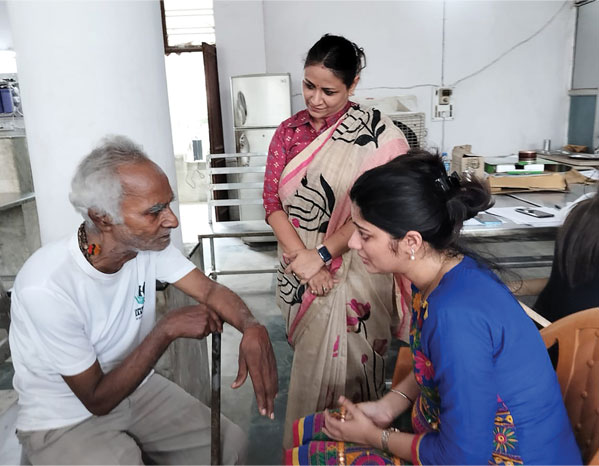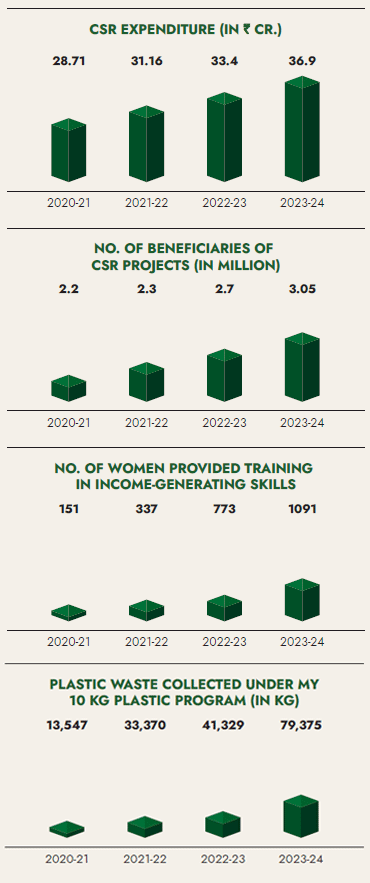Social and Relationship Capital
Dabur promotes a relationship of mutual trust and respect with our billions of consumers and the community, as we strive to improve their quality of life through our products and a series of development initiatives. All through our 140-year-long journey, we believe that building strong partnerships with our consumers and the community is the bedrock of our success. We recognise the value of nurturing relationships built on trust, transparency, and shared goals as we go about delivering our Vision of being 'Dedicated to the Health & Well-Being of every Household'.
We have put in place mechanisms to ensure that our consumers' needs are appropriately addressed, and their grievances resolved in a time-bound manner. Our commitment to community begins long before we initiate production in our manufacturing facilities, continuing to positively impact lives in our vicinity. We prioritize fostering strong connections with all stakeholders, including supply chain partners and the media, built on a foundation of mutual trust and respect. By actively listening to and understanding their perspectives, we glean valuable insights that guide our decision-making processes and empower us to generate positive impacts within the social landscape where we operate.
Key Highlights of FY 2023-24
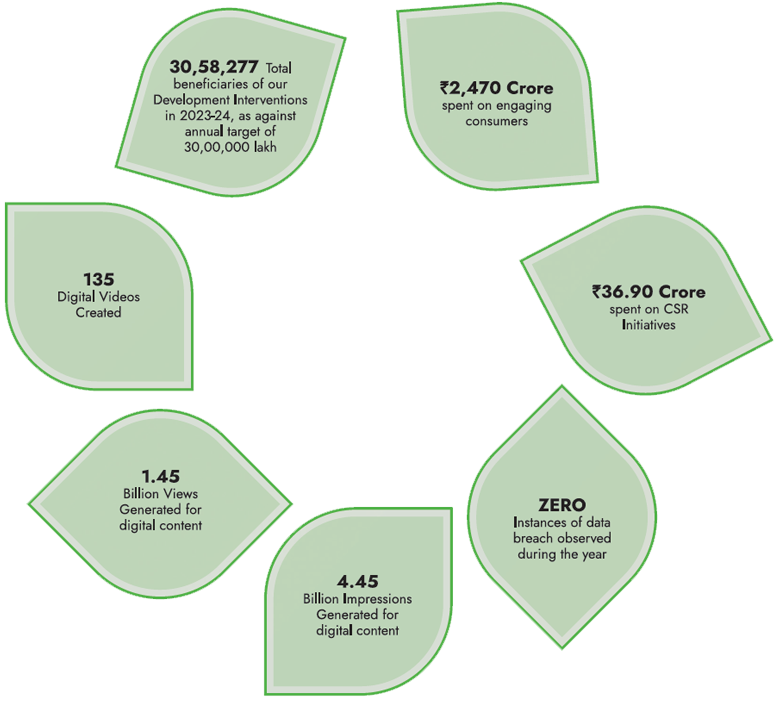

Brand Dabur instills trust in our consumers, anchored by our unwavering commitment to quality and integrity. We have always believed in being a 'Business with a Heart'. We understand that responsible communication is as vital as creating safe products and it helps in building and strengthening brand trust in the minds of our consumers.
Communication with our our consumers and our customers is a responsibility we take seriously. Therefore, we prioritize responsible business practices and ethical marketing principles to achieve our motto of being 'Dedicated to the Health & Well-Being of every Household'. We are committed to promoting our products and services in a manner that enhances the health and happiness of our consumers. Our Ethical Marketing Policy governs all forms of communication aimed at promoting our products, enabling consumers to make informed decisions. Upholding principles of honesty, balance, and transparency, we ensure that our Marketing and Brand Communications meet the highest standards.
Responsible marketing is more than just a buzzword at Dabur; it's a fundamental approach that shapes the ethos of our brand and our relationship with our consumers. At its core, it entails promoting products in a manner that respects ethical considerations, societal values, and environmental sustainability.
We label our products responsibly and lay a strong emphasis on communicating responsibly and ethically with our consumers. Product and labelling responsibility, for Dabur, covers all aspects, ranging from ingredients, manufacturing, labelling and packaging to marketing, advertising, transport and the sale, disposal and safety of our products, as well as environmental matters. It is not only a legal requirement but also as an important competitive factor with a lasting impact on the trust that our consumers repose on us.
Our commitment extends to providing accurate information across all channels, including advertising, promotions, and digital marketing. We even spread awareness among our consumers on the safe disposal of packaging, post-consumption.
At Dabur, place a strong emphasis on communicating responsibly and ethically, both through product advertisements and product labels. The intent is to empower our consumers and give them access to the ingredients and nutrition information of our products to help them make informed choices. All our product labels are meticulously crafted by our technical experts, conveying only scientifically verified information. Accordingly, we will not mislead in our statements or claims, and only authorized individuals will speak on behalf of the Company. We remain vigilant about consumer transparency trends and regulatory changes, adjusting our practices accordingly. Compliance with government regulations and legislation is non-negotiable.
We are also mindful of the beliefs and practices of all religions and classes while designing our product communications, and refrain from misinforming consumers about our competitor's products or services. Not just within the organization, we also strive to drive diversity and inclusion in our marketing communications to ensure that diverse cohorts are adequately represented and served well through our products. We comply with the advertising standards on marketing with respect to different consumer groups like children, women, etc. Building trust through truthful and factual communication is integral to our approach.
Recognizing the importance of responsible handling of consumer data, we prioritise consumer trust and privacy. At Dabur, we respect and protect the privacy of individuals by complying with relevant rules and regulations. Our track record speaks for itself, with no reported cases of non-compliance in marketing communications, product information, or labeling in fiscal 2023-24.
Prioritizing the well-being of people and the planet not only mitigates reputational risks but also positions Dabur as a catalyst for positive change, earning admiration and support from consumers and stakeholders alike. By embracing responsible marketing practices, we can build trust, enhance our image, and contribute to a better world while securing a place in the hearts and minds of our consumers.

In our endeavor to uphold the highest standards of data integrity and privacy, we are pleased to announce our achievements and commitments for the fiscal year. Firstly, Dabur takes pride in declaring ZERO data breaches, a testament to our robust cybersecurity measures and the diligence of our team. This achievement underscores our unwavering commitment to protecting the sensitive information entrusted to us by our stakeholders.
A steering committee, consisting of representatives from IT, HR, Legal, Admin and the risk committee, has been established to supervise operations related to cyber security and data privacy. Our approach to data privacy and cybersecurity governance is multi-faceted and operates at both the Steering Committee and Executive levels. The Steering Committee meets quarterly and plays a pivotal role in overseeing strategic initiatives and ensuring alignment with regulatory requirements. Simultaneously, executive leadership provides operational guidance and allocates necessary resources to support the implementation of our governance framework.
We conduct regular external and internal audits for ISO 27001, including vulnerability assessments to evaluate the integrity of our systems and their impact on user data. Findings from these audits are meticulously reviewed, and any identified vulnerabilities prompt immediate remediation efforts to ensure the continued security of our infrastructure.
A cornerstone of our governance approach is the continuous training and awareness of global Dabur users regarding data privacy and cybersecurity best practices on a monthly basis. We invest in comprehensive training programs to equip our workforce with the necessary knowledge and skills to effectively safeguard sensitive information and mitigate potential risks.
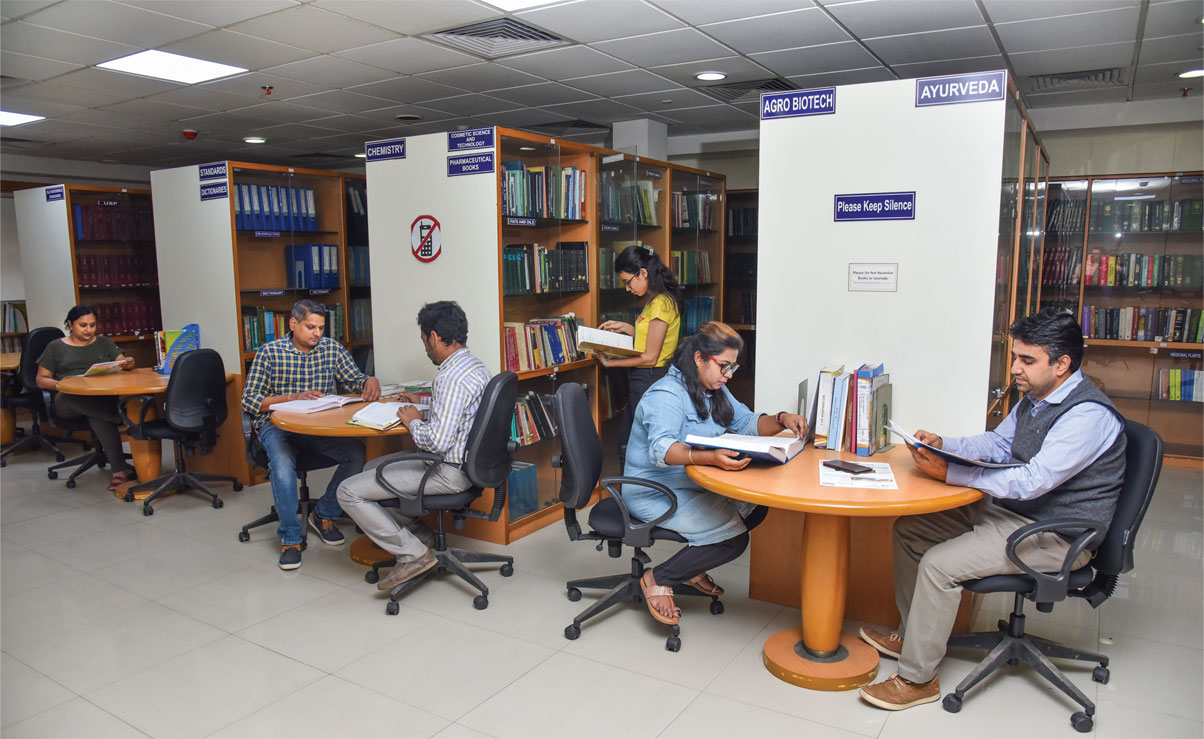
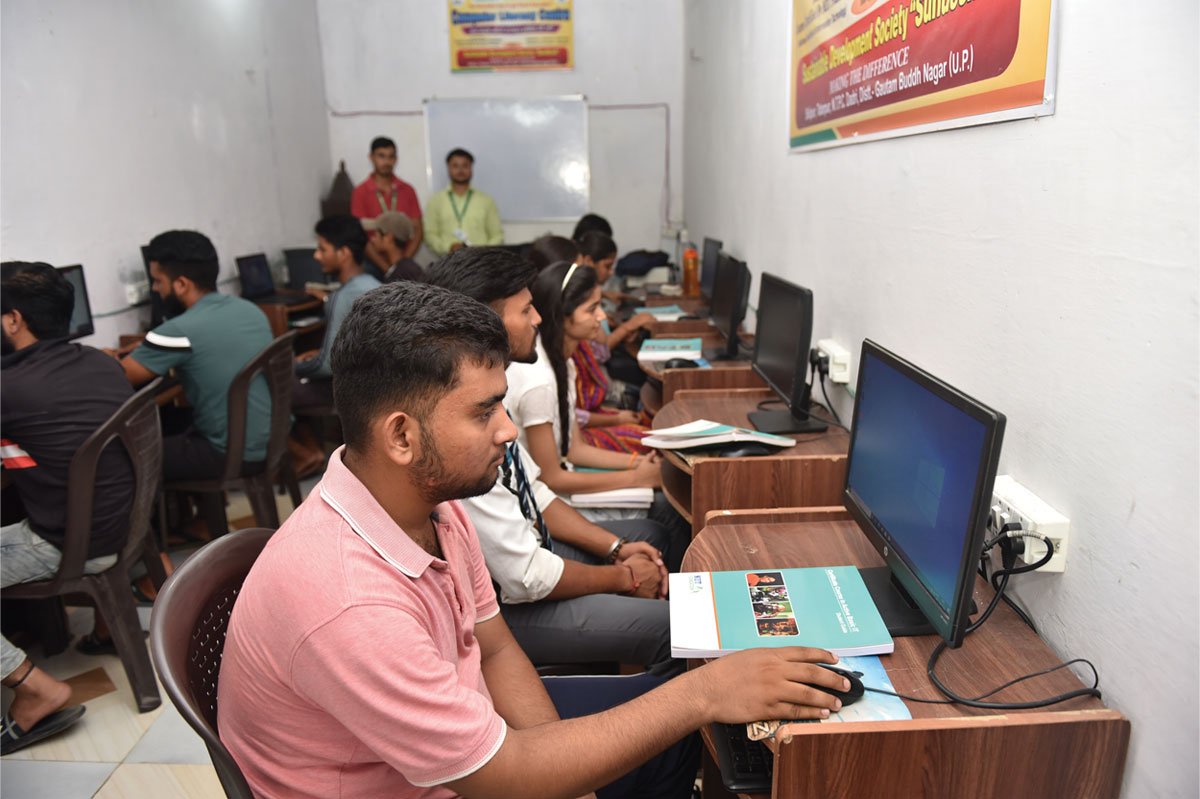
Identified data privacy risks are seamlessly integrated into our broader risk and compliance management framework. This integration enables us to take a holistic approach to risk mitigation, proactively addressing emerging threats and ensuring compliance with evolving regulatory standards. We are committed to conduct rigorous data privacy risk assessments to identify potential vulnerabilities and threats to our systems and user data. Mitigation strategies, including encryption protocols access controls are implemented to mitigate these risks and enhance our overall security posture.
Robust mechanisms are in place to ensure the effective implementation of our privacy policy throughout our entire operation, including our value chain partners. Regular monitoring and compliance checks are conducted to uphold our commitment to data privacy standards and mitigate any potential breaches in the value chain.
Transparency regarding the utilization of customer and consumer data for secondary purposes is paramount to our governance approach. We employ monitoring mechanisms to track and report the proportion of customers and consumers whose data is utilized, demonstrating our commitment to accountability and transparency in data handling practices.
We are committed to empowering our customers and consumers to exercise control over their data through various options, including opting out, granting opt-in consent, requesting data transfers, corrections, and deletion as per the Indian Digital Personal Data Protection Act (DPDP Act). These options are readily accessible and reflect our dedication to fostering trust and respect for individual privacy preferences.
Comprehensive policies and procedures such as Dabur Internal Global Privacy Policy, Information Security Policy, Access Control Policy, Incident Management Policy etc., govern our data privacy and cybersecurity practices, encompassing awareness training, escalation procedures, and integration into employee performance evaluations. These measures ensure compliance and accountability at all levels of the organization, reinforcing our commitment to maintaining the highest standards of data privacy and cybersecurity governance.
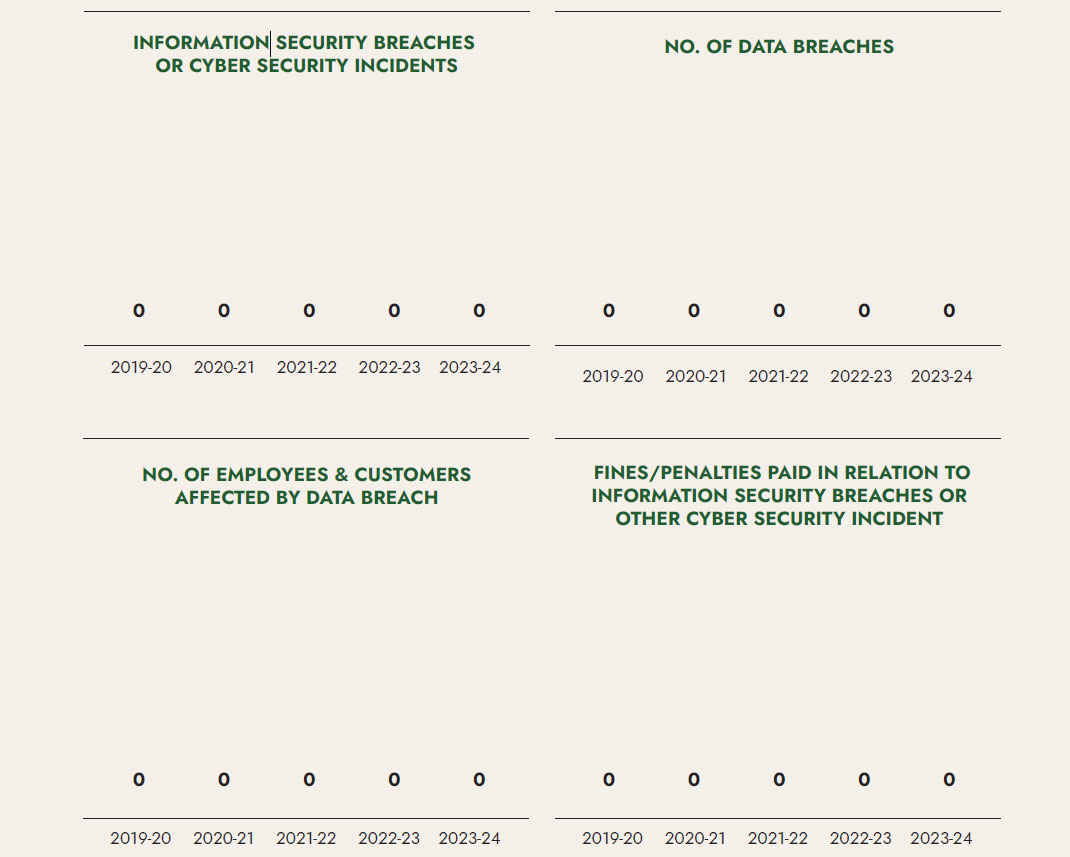
At Dabur, we take our moral and societal responsibility to animals seriously and support alternative approaches to animal testing. We do not conduct animal testing on any of our cosmetics products. Our investment in alternative non-animal scientific models has enabled Dabur’s entire cosmetic category products to be certified by People for the Ethical Treatment of Animals (PETA) as ‘PETA-approved’. All our PETA-approved brands and products go beyond the standard require- ments to ensure there is no animal testing conducted for both ingredients and finished products.
Our science-backed Ayurveda/Healthcare division regularly conducts scientific studies as part of R&D for establishing the efficacy and safety of Ayurvedic Healthcare products/medicines to ensure compliance with the existing requirements of the Drugs and Cosmetics Act for India and other countries based on exporting country regulatory guidelines. We abide by the guidelines of the respective countries which demand the proof-of-concept studies in support of safety & efficacy studies through bioassay, invitro-cell line, in-vivo human, IC50 etc.
Abiding by the governing regulatory guidelines of regulatory and scientific approval committee, we conduct toxicity, safety studies through the approved contract research organizations to ensure of the fact that they follow proper animal ethics approval and abiding the respective guidelines prevailing from time to time.
All our animal testing is carried out by licensed or accredited research facilities where animal welfare standards are enforced by independent inspections.
All our animal testing complies with internationally accepted guidelines. The majority of our third-party CROs are CPCSEA (Committee for the Purpose of Control and Supervision of Experiments on Animals)-registered laboratories. CPCSEA is a statutory body formed by the Act of the Indian Parliament under the Prevention of Cruelty to Animals Act 1960.
Dabur is committed to high animal ethics standards and ensures that all procedures comply with regulations and experiments are optimised to avoid suffering or distress to the animals. As part of our commitment to animal welfare, we have cultivated a culture where the 3R Principles of Reduce, Refine, and Replace the use of animals in research and testing are encouraged, wherever possible.

More than 75% of our animal studies are conducted at laboratories, which have Association for Assessment and Accreditation of Laboratory Animal Care (AAALAC) accreditation and compliance with 3R during animal testing.
We are deeply thoughtful about the use of animal experiments in drug research and our long-term aspiration is to be a pioneer in phasing out animal use and replacing animal work with better, cutting-edge alternatives.
We employ a balanced array of campaigns – spanning on-air, on-ground, and virtual platforms – to effectively engage with and build stronger relationships with our large and expanding consumer base. Our consumer-centric engagement initiatives underpin our unwavering confidence and dedication to our valued consumers. These interventions include raising awareness about our products and activities as well as capturing consumer feedback.
During the year 2023-24, we have successfully executed a series of innovative and impactful consumer engagement initiatives, setting new benchmarks in our industry.
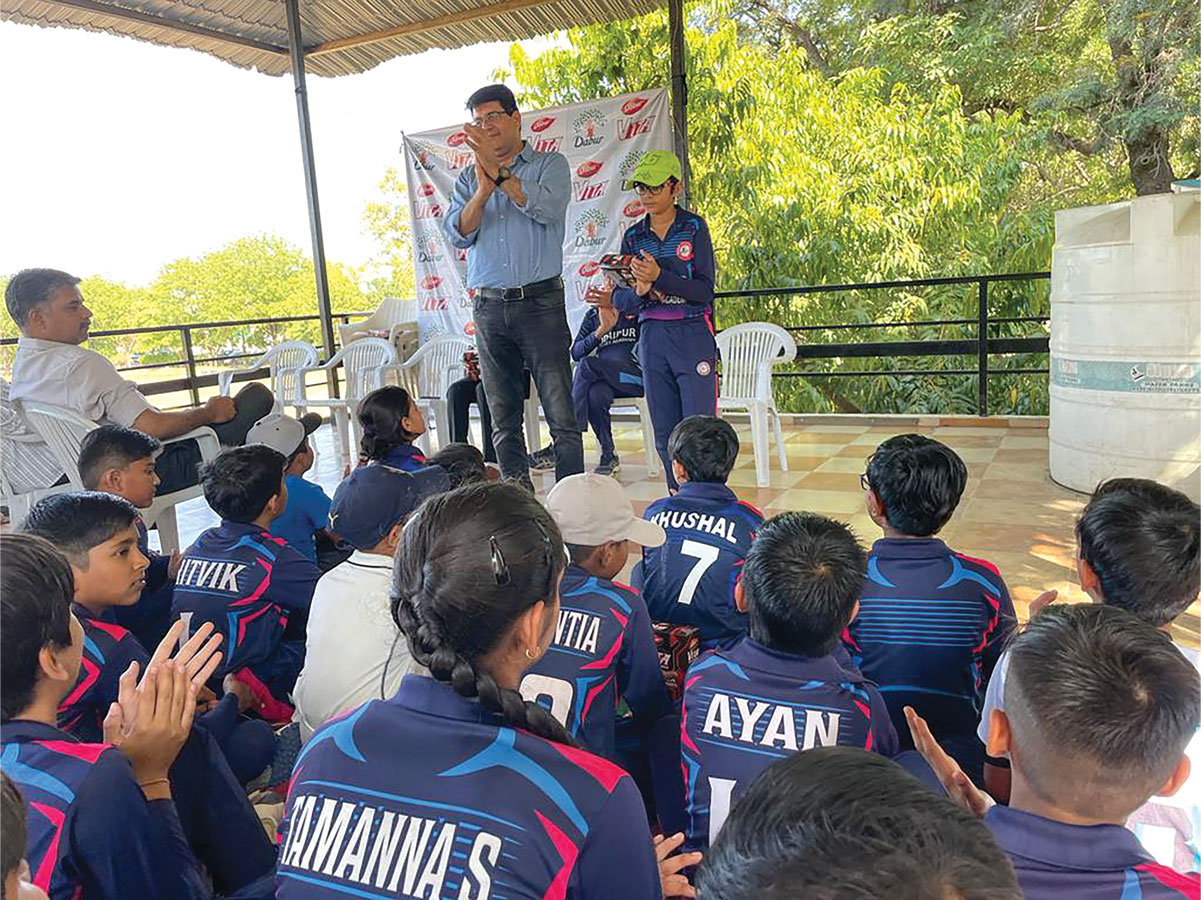
Vita Health Awareness Camps
As part of its commitment to safeguard the health of the future generations, Dabur Vita, a functional drink from the House of Dabur, organised Health Awareness camps to promote 7 vital health needs like good digestion, respiratory health, strong bones & muscle, strength - stamina, and better immunity among school-going children. The drive reached out to young trainees in sports academies across the country. The kids were educated on the importance of mental alertness, physical stamina and strong immunity through basic hygiene practices and a nutritious diet. A special Health Kit comprising Dabur Vita was also provided to these students
Odonil PayTM Sound Boxes
Odonil joined hands with PayTM to launch unique PAYTM Sound Boxes with Odonil details in retail stores across the country, becoming the first FMCG brand to remind consumers for the home-care products using the PAYTM Sound Boxes as a media vehicle. Generally, the sound boxes placed in the outlets make a confirmation sound for the received payment. With the new PAYTM Sound Boxes, Odonil used these sound boxes as a media vehicle and will be reminding consumers once they have made payments that they have forgotten to buy Odonil for their homes.
Dabur Pudin Hara Fizz at Nauchandi Mela
Dabur Pudin Hara Fizz entered the Asia & India’s Book of Records with a new landmark of setting up a massive installation of Pudin Hara Fizz demonstration zone at Nauchandi Mela, Meerut – one of the biggest, month-long, most colourful and interesting fairs of the country. Covering an expansive area of 23 ft by 10 ft, the demonstration zone offered a unique experience, immersing visitors in a world of digestive wellness. Pudding Hara Fizz spared no effort in transforming this space into a sanctuary of relief, where attendees could explore an array of natural remedies, education, and interactive experiences. The innovative demonstration zone had a life-size functional representation of Pudin Hara powdered antacid. Our on-ground team is reaching out to more than 2000 people per day with a wet sampling of Pudin Hara Fizz to provide instant relief from acidity and gastric troubles to the people.
Sanifresh Gurudwara Sewa Initiative
Dabur's toilet and surface cleaner brand SaniFresh launched a "Gurudwara Seva" initiative in Delhi and Punjab, to ensure cleanliness and maintaining a hygienic environment within the sacred premises. Under this initiative, Sanifresh Toilet Cleaners and Dazzl Floor cleaners joined hands with 11 Gurudwaras of Delhi and Punjab to maintain fresh and hygienic toilets and floors in these Gurudwaras.
Odomos Celebrates #SurakskaKaEandkan
Odomos took a leap of faith inspired by Raksha Bandhan and advocated a strong message of #SurakshaKaBandhan against vector-borne diseases, between siblings. On the occasion of Rakshabandhan, Odomos organised mall activations to raise public awareness about vector-borne diseases. A team from Odomos went to several malls across major cities in India to engage with visitors who were there with their siblings. The events included several fun activities hosted by the Odomos emcee for volunteering brothers & sisters. Q&A sessions, dancing, singing and more, the event was no short of a celebration! Free samples of the Odomos Suraksha Bandhan bands were distributed to siblings who participated.
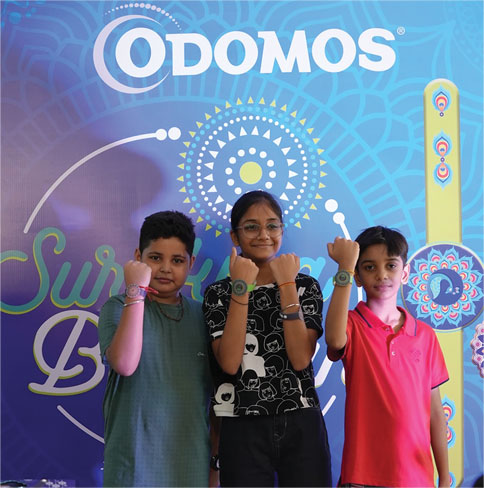
Dabur Honitus Campaign to Fight Cough & Cold
Dabur Honitus launched a campaign to fight cough & cold in India. Under this initiative, Honitus will be conducting health sessions for kids and educating them about prevention from cough & cold and other throat infections along with distributing free samples of Honitus to protect themselves from this disease.
Dabur at Durga Puja
Our leading Brands, Dabur Chyawanprash, Dabur Red Toothpaste, Odonil and Dabur Gulabari ignited the festive spirit with a range of innovative activities across Puja Pandals in Kolkata during Durga Puja. To give Pujo a fragrant touch, Odonil created Odonil Villa, a fragrance tunnel at Shiv Mandir Puja Pandal. It is set up right at the entrance of the Pandal, giving it a traditional Bengali home look. Dabur Chyawanprash, on the other hand, organised the Doshe Dosh Contest, offering participants a chance to join the Astra Daan ceremony at Singhi Park Puja Pandal. Dabur Red Toothpaste provided visitors at the Tala Bridge near Tala Barowari Puja Pandal a first-of-its-kind 3D experience by installing an Anamorphic L-shaped LED screen, a unique immersive installation. Dabur Gulabari organised the Gulabpari Glowing Diva beauty contest, offering girls to make reels to participate in the contest and stand a chance to become a Wild Card entry to the 10th edition of the FFACE calendar 2023.
Dabur brands at Chhath Puja Mahaparv 2023

Dabur's leading brands like Dabur Red Toothpaste, Dabur Chyawanprash, Dabur Honey, Vatika Shampoo, Dabur Lal Tail, Hajmola,and Dabur Sarson Amla strengthened their ties with the people of Bihar and Uttar Pradesh, with a series of consumer connect activations at the Mahaparv Chhath Puja. Dabur Lal Tail's 'Maayi Ka Aashirwad - Ichha Kalash' initiative emphasised the brand's benefits for building baby bones and muscles, offering people a unique opportunity to submit their wishes to Surya Dev Temple. Dabur Red Toothpaste, on the other hand, rolled out the 'Mazboot Dant Challenge' with a sugarcane peel-off contest. Additionally, Dabur Honey added sweetness to the festivities by preparing and distributing the traditional sweet, Thekua, using honey instead of sugar.
Dabur Vatika Special Engagement Zone
Dabur Vatika created a special engagement zone at the International Trade Fair in Delhi, offering visitors a unique opportunity to discuss their hair-related issues with expert hair professionals. The engagement zone also featured an impressive display of Vatika's extensive range of products. Additionally, visitors also received complimentary scalp checks, enabling them to better understand their scalp conditions and identify any underlying hair problems.
Building strong and long-lasting relationships with each generation of consumers based on their respective attributes is the key to success for any brand in today's hyper-competitive environment. At Dabur, we have been reaching out to each generation, speaking to them in the language they speak, in the media they consume and with the content they prefer.
Targeting the millennials and centennials, a bulk of this specially created content is shared on digital platforms. We have seen our digital spending grow fast, and today it account for over 30% of our total ad spends.
Our digital campaigns have earned millions of media impressions and generated massive amounts of traffic on various social media platforms. Following are some of the highly popular Digital Media campaigns undertaken by our brands in the past one year.
Dabur Herb’l Black for White
Dabur Herb’l Charcoal Toothpaste launched a soul-stirring film targeted at Millennials and Gen-Z that questioned the myth around the colour black and brought alive the product’s ability to add strength, positivity, growth and, of course, sparkling white teeth. The creative approach is rooted in consumer insight. Black as a colour for toothpaste is a pivotal shift, which breaks more than a few old norms. We believe that addressing this honestly will enable us to get across the message about the strong advantages of Black for White.
Odomos #GiveMomAHand Campaign
The love and efforts of a mother are recognised and appreciated. But, how often is she given a helping hand? A study by the Organization for Economic Co-operation and Development (OECD) found that Indian mothers spend an average of 352 minutes (about 6 hours) per day on home chores. On Mother’s Day, Odomos launched a digital campaign urging society to take #GiveMomAHand pledge.
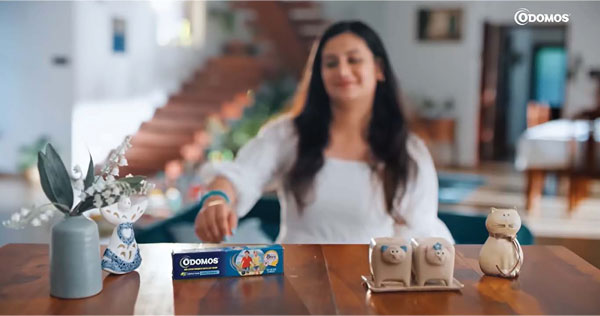
The film captured a precious monologue by a kid where he expresses his gratitude for all that his mother does and recognises that she needs a helping hand too. He adorably demands everyone in the house to support her by saying, "sab milkar kaam ka dhyan rakhenge" (we will all take care of the work together). The child articulates his absolute desire very precisely, when he says, "All I want is my mother’s smile". The need for a social support system for mothers was highlighted through this campaign.
Rare Stories by Meswak
Dabur Meswak Toothpaste has been created using extracts from the rare Miswak tree, which is known for its immense oral care benefits. What makes this tree even rarer is its resilience to withstand the brutal forces of nature in the dry, arid regions of Africa and the Middle East. The sheer resemblance of the characteristics of the Miswak tree with that of human beings, is what drove Dabur Meswak to begin their journey in highlighting rare and inspiring stories about people in their digital campaign ‘Rare Stories by Meswak’. This digital-first campaign threw the spotlight on people who have stepped out of the box to follow their passions and dreams. Dabur Meswak not only acknowledged these stories but also gave them the due glory that they deserved. The main objective of this campaign was to discover people across the country who are doing something different and to provide them with a platform through which their stories can be heard.
Odomos #SurakshaKaBandhan
Odomos used the occasion of Raksha Bandhan to advocate a strong message of #SurakshaKaBandhan between siblings to fight vector-borne diseases. Traditionally, a brother promises his sister protection against all evils when she ties a Rakhi to his wrist. Odomos strengthened the narrative with a digital film that captured the moment between a brother and sister where the sister ties an 'Odomos Suraksha Bandhan' mosquito repellent on her brother's wrist and says, "Ye hai suraksha bandhan, Odomos ka. Ye teri raksha karega Dengue, Malaria jaisi bimari failane vali mosquitoes se." Her adorable little brother proceeds to tie it on her wrist as well, signifying the same promise.
Dabur Amla Hair Oil's fresh perspective on Karwa Chauth
Dabur Amla Hair Oil, a brand committed to empowering women and nurturing strong relationships, collaborated with Priya Malik to reinvigorate Karwa Chauth in a way that's unique and fun. With the 'Jadon se Mazboot Riwaaj - Karwa Chauth Special' campaign, the brand underscored that Karwa Chauth is a voluntary expression of love and affection, far from being an obligatory ritual. The film eloquently showcases Priya Malik's transformative journey with Karwa Chauth, influenced initially by her parents' experiences. Following her marriage, Priya found herself cherishing the smaller gestures associated with the festival. It became an opportunity to strengthen the bond, express devotion, and share love. Karwa Chauth, once perceived as an obligation, has now evolved into a jubilant celebration of love and equality within marriages.

Dabur Amla Hair Oil Plays Cupid on Valentine's Day
Renowned for fostering strong relationships and stronger bonds, Dabur Amla Hair Oil played the role of Cupid for Valentine's Day with its new campaign 'Celebrating all love languages'. The brand stepped into the world of love with this film, featuring the famous influencer couple, Shreya Kalra and Rishabh Jaiswal. The film gracefully showcases four distinct love languages, illustrating how the couple expresses their love. They start their film with the most famous act among the younger crowd, “The Princess Treatment” where the ‘boyfriend’ cooks for the ‘girlfriend’, brings the food, dims the light, and also gets her a blanket for comfort. They successfully capture other 3 love languages, “The Love Tuck”, “The ‘Olive’ You”, and “You’re ‘Oil’ I need”. Dabur Amla successfully introduces the act of giving a soothing head massage, or 'champi', as a tender expression of love after a long day and names it “You’re ‘Oil’ I need”. By capturing these moments between couples, the brand embodied simplicity and purity, reminiscent of its essence.
Our commitment to our consumers transcends the point of sale; it encompasses their entire journey with our product, from usage to disposal.
To elevate our consumers' experience with Dabur and our products, we have a specialised customer service team that’s devoted to optimising processes, reducing customer effort, and leveraging technology to enhance efficiency and decrease response time. We also roll out initiatives to continuously enhance the skills and knowledge of our customer service representatives.
Dabur has established a grievance redressal mechanism for all stakeholders, with internally defined processes communicated transparently to ensure accountability and satisfaction among our stakeholders. At Dabur, we have a comprehensive whistle-blower policy 'Direct Touch' that allows and encourages all stakeholders to bring to the management's notice concerns about suspected unethical behaviour, malpractice, wrongful conduct, fraud and violation of the company's policies. A 24x7 Independent Hotline Number (1800-103-1644) is also in place where all stakeholders can call to report any instance of malpractice, without fear of reprisal or retaliation of any kind.
For Consumers
All Dabur products carry a toll-free number (1800-103-1644) and a dedicated email address (daburcares@dabur.com) to assist consumers in case of any grievance or query. The calls are attended by our trained product experts at the Call Center, who seek to address their queries real-time. Some technical queries are also forwarded to our experts, who connect back with these consumers to provide them with detailed responses. We also have specialised Ayurvedic practitioners available for online and telephonic consultations. The consumers can consult these practioners discuss their specific health concerns, and seek remedies and medicines for the same.
All product-related complaints are registered and a unique complaint number is generated for each complaint, which is also shared with the consumer for future reference. This is followed by a detailed conversation with the consumer within the same working day to address the concern and assure timely closure of complaints.
These conversations help resolve the complaints that are not genuine or have occurred due to mishandling of the product on the consumer end. The consumer is also educated about proper handling and storage of products. The balance complaints are forwarded to local area representatives for speedy closure and a replacement is provided to the consumer. Additionally, we have engaged courier agencies to ensure speedy replacement of complaint packs. In select cases, where consumers seek a refund, we also provide timely refund of their cost price into their bank accounts.
In addition, we have an Online Reputation Management team in place, which interacts with consumers via social media platforms, addressing their queries and resolving their grievances on a real-time basis. A new web-based Customer Relationship management (CRM) framework has also been implemented for capturing queries, concerns, complaints, feedback and suggestions received across platforms and channels. This CRM platform also helps us gather consumer insights to help not only bring about process-related changes to improve our grievance handling mechanism, but also roll out products to meet their specific needs.
In fiscal 2022-23, 3,475 complaints were registered in our consumer grievance redressal system. Of these, 3,460 complaints were resolved in the reporting year and the balance was resolved amicably in the following month.
For Community
We have community development executives stationed at 5 of our plant locations, in addition to local volunteers who live and work with the community on a daily basis. In addition, our individual unit heads and unit HR heads in other locations work closely with the communities to address any concerns that they may have.
They interact with the community members on a daily basis to address their queries and concerns, if any. In 2023-24, we haven’t received any complaints from the communities we operate in.
For Investors and Shareholders
We have established a dedicated email ID, investors@dabur.com, in addition to corpcomm@dabur.com, where investors and shareholders can share their grievances or queries. During the year 2023-24, we received 26 complaints from the shareholders. Of these, 24 were closed by the end of the financial year. The remaining two complaints, which were received in the month of March 2024, were also closed in the subsequent month.
For Value Chain Partners
Our Value Chain Partners and Business Associates can reach us on corpcomm@dabur.com, where they can share their grievances or queries. We also have a comprehensive Whistle Blower Policy 'Direct Touch', which allows and encourages our Value Chain partners to bring to the management’s notice concerns about suspected unethical behaviour, malpractice, wrongful conduct, fraud and violation of the company’s policies.
For Employees
Our employees can reach us at corpcomm@dabur.com where they can share their grievances or queries. Our employees can also write to their respective HR managers. We also have a comprehensive Whistle Blower Policy, ‘Direct Touch’, which allows and encourages employees to bring to the management’s notice, their concerns about suspected unethical behaviour, malpractice, wrongful conduct, fraud and violation of the company’s policies.
As the world comes together to respond to mounting concerns around environmental, social, and economic challenges, we understand that the Corporate Sector and the Government need to partner on matters of public interest. We approach our engagements with the Government agencies and departments in a transparent and ethical manner and require our third-parties to do the same.
Working with Trade & Industry Associations
We are a member of various industry and trade associations such as Confederation of Indian Industry (CII), Federation of Indian Chambers of Commerce and Industry (FICCI), PHD Chamber of Commerce & Industry (PHDCCI), Indian Beverage Association (IBA), Action Alliance of Recycling Beverage Cartons (AARC), PET Packaging Association for Clean Environment (PACE), India Honey Alliance (IHA), Ayurvedic Drug Manufacturers Association (ADMA), Indian Beauty and Hygiene Association (IBHA), Association of Manufacturers of Ayurvedic Medicines (AMAM), All India Food Processors Association (AIFPA) and Waste Efficient Collection and Recycling Efforts (WECARE).
We are also members of various task forces and forums within these trade bodies. We actively contribute to these forums on policy matters and issues that impact the interests of our stakeholders. We also partner with these associations in policy development processes but have not been lobbying on any specific issue. In the past, we have participated in forums pertaining to:
- Corporate Governance
- Consumer Interest
- Tackling Counterfeiting
- Water Conservation & Management
- Biodiversity Protection
- Plastic Waste Management
Through these partnerships, we advocate on matters that are crucial to our company and the industry, besides the broader concerns pertaining to sustainability and nutrition.
Political Contributions
Dabur does not make financial contributions to candidates, political parties, or committees. We also do not contribute funds for electioneering campaigns or communications. We respect the rights of our employees and associates to independently contribute to candidates or causes of their preference using their personal time and resources.
In fiscal 2023-24, there were no financial or in-kind political contributions made by us.
Policies and Practices
We collaborate with industry peers to foster meaningful discussions on issues impacting our sector. These encompass areas such as consumer rights, nutrition, and plastic waste management, which wield significant potential to affect both people and the planet on a substantial scale.
As a consumer-facing company, we understand the importance of proactively engaging with the fourth estate to effectively communicate our vision and strategy to various stakeholders and drive healthy consumerism. This healthy and transparent engagement with the media–from print to electronic and digital–helps improve our stakeholders' knowledge and understanding about our products and initiatives and build a positive impact on matters related to sustainability and climate change.
At Dabur, We understand that stakeholders shouldn’t have to hunt for information about the Company, and a good newsroom or media section should make relevant information readily accessible and easy to find. We believe in sharing accurate information through various mediums, making us one of the most trusted and transparent brands in India. Additionally, we engage with our consumers and other stakeholders through other mediums such as TV and print advertisements, banners and hoardings, social media, YouTube influencers and digital campaigns.
Our commitment to social responsibility and community engagement is evident in our efforts to empower communities and contribute to the prosperity of the communities we serve. We believe in not just improving the quality of life of our communities but also being a neighbour of choice by implementing strategic need-based CSR interventions. We have been at the forefront of conducting impactful development projects and empowering various segments of society for the past three decades. To make a difference in the lives we touch, we collaborate with societies, educational institutions, Government bodies, NGOs, wellness foundations, and a variety of other organizations. Dabur has been actively contributing to the social and economic development of the communities in which we operate, helping build a better, more sustainable way of life for the weaker sections of society and raising the country's human development index. Our structured community development interventions were first rolled out in 1994, long before the CSR regulations came into force. The group’s commitment towards community development can be traced back to our founder Dr. S. K. Burman, who said: "What is that life worth which cannot bring comfort to others".
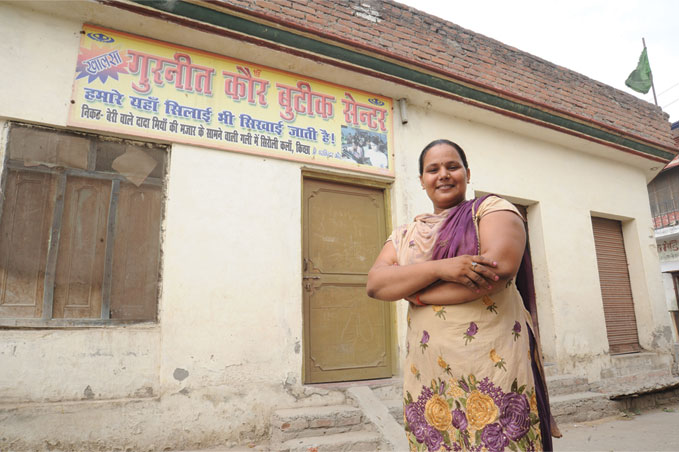
Key Highlights of FY 2023-24
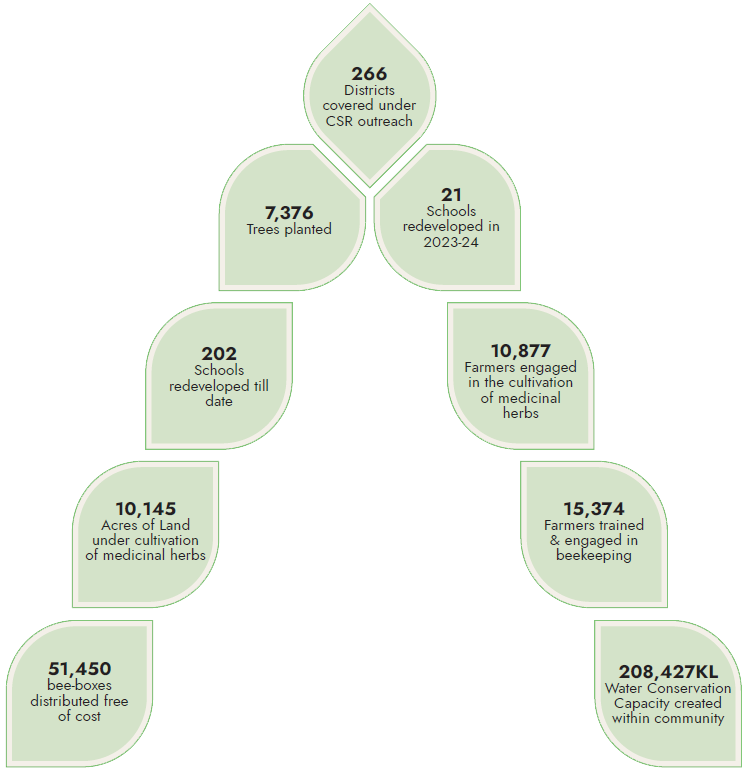
Our CSR Vision
Through sustainable measures, actively contribute to the Social, Economic and Environmental Development of the community in which we operate, ensuring participation from the community and thereby creating value for the nation.
Our CSR Mission
- Ensuring socio-economic development of the community through multiple participatory and need-based initiatives in the best interest of underserved sections of the society to help them to become SELF-RELIANT and build a better tomorrow for themselves.
- Ensuring environmental sustainability through ecological conservation and regeneration, protection & regrowth of endangered plant species, and promoting biodiversity.

We have an established CSR Committee comprising four Directors and its composition more than adequately meets the requirements of the Companies Act, 2013. We have in place a well-structured CSR Policy formulated by the Committee and approved by the Board of Directors. This CSR Policy is also a declaration of our intent to contribute to creating a better and self-reliant society.
Through our well-designed programs, we have identified four distinct areas where we can contribute and truly make a difference. These are:
- Eradicating Hunger, Poverty and Malnutrition
- Promoting Health Care, including Preventive Health Care
- Ensuring Environmental Sustainability
- Promotion of Education
In addition, other areas identified for rolling out development projects are:
- Skill Development & Women Empowerment
- Promotion of Sports
- Rural Development
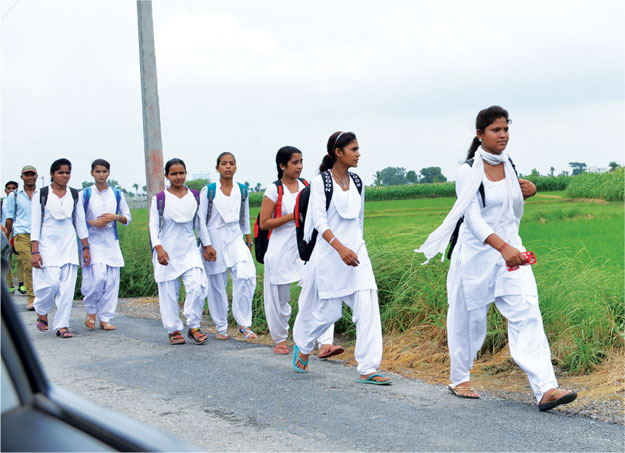
The Board Committee reviews all the activities undertaken by the Company and may consider other areas or activities for inclusion in this policy. The CSR department provides regular progress reports and updates to the CSR Committee of the Board. The committee is also given a detailed report of the activities undertaken each quarter, along with targets and reasons for variance, if any.
Our CSR implementation process has always been developed keeping in mind the specific needs of the communities that we operate in. Prior to finalising a project, meetings, and Focus Group Discussions (FDGs) are conducted with the community members, involving all sections of the society, to identify their needs. On the basis of the findings of these need assessment studies; a detailed and phased development plan is prepared. Subsequently, the initiatives are implemented through our CSR foundations as well as through Partner NGOs.
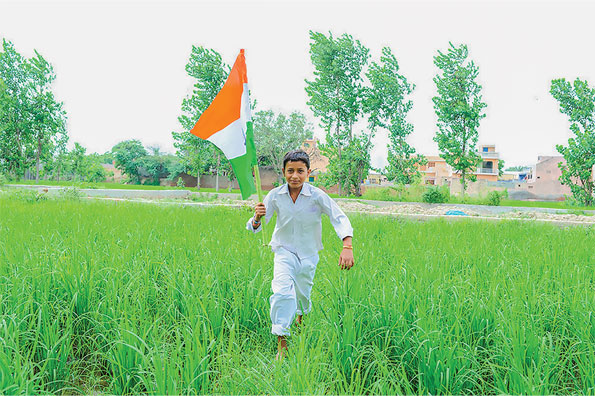
We understand that involving the community in every step of the development work ensures that CSR initiatives are more relevant, sustainable, and effective. Collaborative efforts ensure that interventions are rooted in local realities, culturally sensitive, and responsive to the community's priorities. We believe that projects where communities are equal participants, both physically and through financial contribution, are always successful and sustainable. Our development programs are always participatory in nature, with the community members being partners and even contributing financially towards their effective roll-out. The local communities are vested with full responsibility and ownership of the projects, once completed. Together, we chart a path towards a better tomorrow, one step at a time.
By leveraging the collective expertise, resources, and commitment, we not only address systemic challenges, but also empower communities, and foster inclusive growth. This collaborative approach has ensured that our CSR initiatives make a lasting difference in the lives of people, driving positive change and building stronger, more resilient communities.
In fiscal 2023-24, a total of 36.90 Crore was spent on community development interventions. Details of the number of beneficiaries across the areas of development are given below:
| CSR Focus Area | Number of Beneficiaries |
| Eradicating Hunger, Poverty & Malnutrition | 18,73,779 |
| Promoting Health Care, including Preventive Health Care | 9,82,762 |
| Ensuring Environmental Sustainability | 1,78,628 |
| Promotion of Education | 5,802 |
| Skill Development and Women Empowerment | 17,243 |
| Promotion of Sports | 63 |
| Total | 30,58,277 |
Dabur is committed to transforming the lives of local communities through meaningful initiatives, especially for the upliftment of disadvantaged and marginalised sections of society. We believe in the power of social inclusivity and have been undertaking development projects with the objective of improving the quality of life and ensuring holistic development of local communities.
Our powerful CSR framework covers key areas of Health & Nutrition, Sanitation, Education, Environment, Skill Development and Sports Promotion, to name a few. Some of our key development projects under each focus area are detailed below.
This program focuses on combating hunger and promoting better nutritional practices at all levels through a series of interventions, targeting the underserved sections of society, particularly the girl child.
Swasth Ghar (SwaG) [Swasthya Aur Suraksha]
Dabur has put together an integrated development program that stands on four pillars which we call SNEH (Self-Defense, Nutrition, Empowerment, and Health) to ensure the overall health and well-being of the vulnerable and less privileged sections of the society. A special focus is on building a better and safer future for girl children living in difficult circumstances by ensuring access to a better quality of life.
The project is being implemented in 8 districts across 5 states (Uttar Pradesh, Uttarakhand, Himachal Pradesh, Madhya Pradesh, and Assam), engaging school-going kids, their families and even adults belonging to vulnerable social groups. The project currently engages directly with a total of 92,793 individuals across these districts.
This program focuses on:
- Safe and Nutritious Food (SNF): Special awareness sessions are organised within schools and villages to promote healthy eating and to empower children with knowledge to choose and consume healthy foods and beverages. We have also trained and appointed Wellness Coordinators in schools, who would conduct these awareness sessions on a regular basis, besides organising activities to make students understand the significance of washing hands and maintaining hygiene. Special programs are also organised with the community on Nutrition Week and Breast-Feeding Week wherein we rope in local nutritionists and health professionals to spread nutrition knowledge, increase the willingness to try fruits and vegetables, and talk about the positive attributes of fruits and vegetables.
- Promoting Kitchen Garden (Gkar Ki Bagiya): In addition to building awareness about health and nutrition, we also support families in getting access to nutritious food. At Dabur, we understand that the well-being of families can be easily achieved by helping them grow their own vegetables. The combination of sun, soil, water, and manual labour is already present, but the biggest challenge is the availability and access to quality vegetable seeds. Under this initiative, we distribute vegetable seeds to families and students, encouraging and training them to grow these vegetables in their kitchen gardens. The cultivated vegetables are mainly used for consumption by the families, but they also sell extra produce in the open market and add to their household incomes.
- Self Defense Training: This program also focuses on coaching them to navigate circumstances they will encounter in life. For instance, we offer self-defense training to vulnerable girls from needy families. We teach young girls to recognise situations where they are not comfortable and how to deal with them. Special emphasis is laid on educating kids about various kinds of touches. For example, a good touch feels caring, like a pat on the head, back, or a bear hug. In comparison, a bad touch can hurt their body or feelings, such as pinching, hitting, or touching any private area.
- Promoting Holistic Health: A series of special health camps, hand wash awareness sessions, oral hygiene camps and awareness camps on menstrual hygiene are organised across schools and villages. Our mission is to inform and educate the public and dispel myths surrounding health, both physical and mental. We also work with local dental colleges to organise special oral check-up camps in villages and provide the beneficiaries with easy access to oral hygiene products.
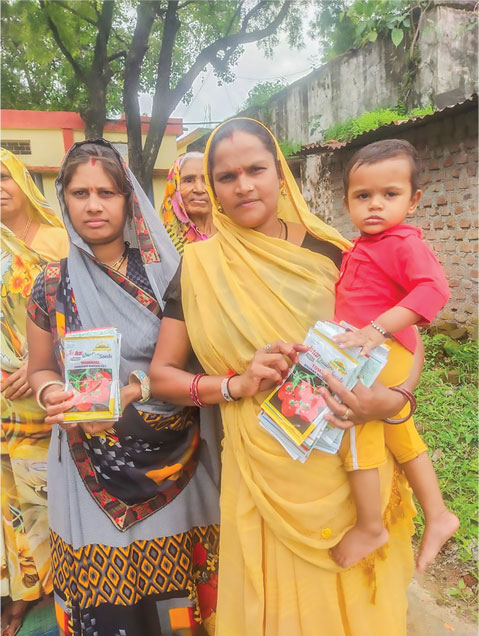
Success Story
Rupeswari Sawtal
Rupeswari is today a beacon of hope and women empowerment in her village. 55-year-old Rupeswari Sawtal lives in Chapaguri village (Assam) with her husband and two daughters. Their son recently moved to the city in search of a job.
Her husband's prolonged health issues have rendered him unable to contribute financially, placing the burden of sustenance squarely on Rupeswari's shoulders. Through our Swastha Aur Suraksha project, Rupeswari received vegetable seeds and support to cultivate them in her kitchen garden. She has since been growing an assortment of vegetables.
Besides gaining easy access to nutritional vegetables for her family, her home-grown Kitchen Garden now helps her earn around `300-400 every day from the sale of excess vegetables grown in her kitchen garden.
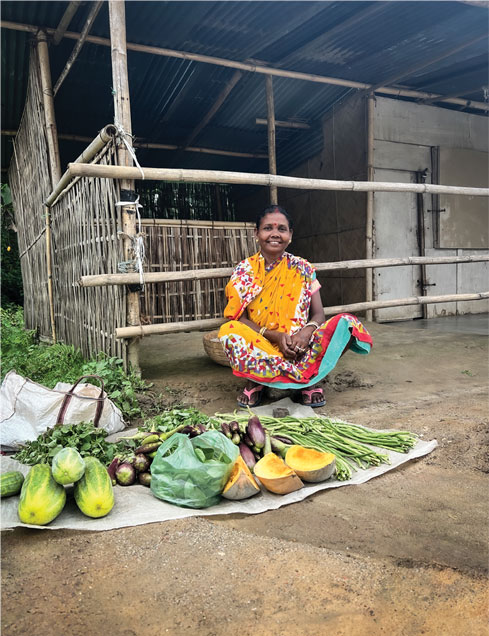
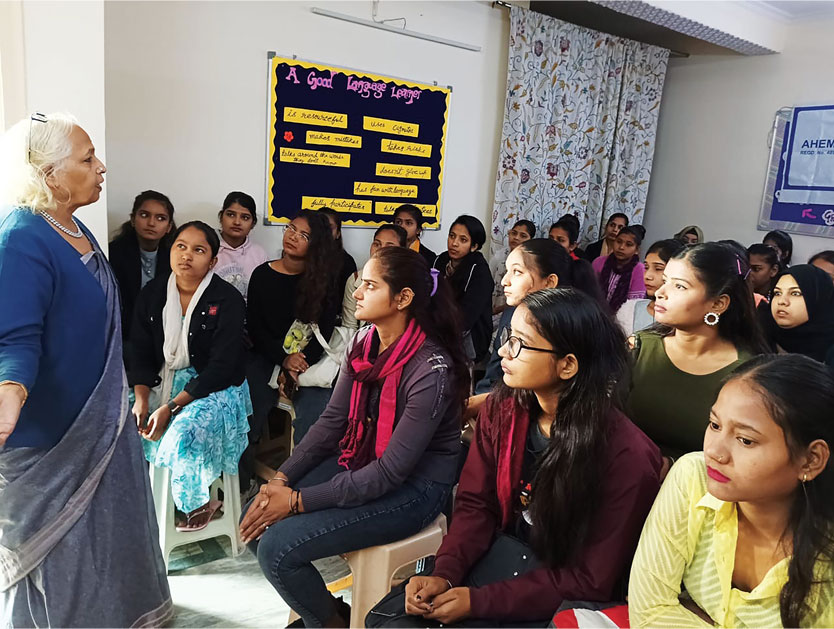
Project Poshan
Adequate nutrition is a fundamental cornerstone of any individual’s health. One of our flagship nutrition support programs, Project Poshan is aimed at building Awareness and changing attitudes and ensure that communities consume healthy, nutritious meals. We also strengthen and promote safe and hygienic living, besides providing essential supplements to the vulnerable sections of society.
Run in the urban slums of Noida, Uttar Pradesh, this community-based approach seeks to increase the coverage of our nutrition support interventions and reduce the prevalence of undernutrition in the country.
We seek to provide not just nutrition awareness to kids from vulnerable sections through a series of nutrition planning programs, but also ensure they have easy access to nutritious food, helping them live a better, healthy life.
Special focus is given to girls from the disadvantaged section by organising menstrual hygiene awareness camps and free distribution of sanitary pads among adolescent girls.
Madaari Mitr (Madaari Mission for Total Rehabilitation)
The Madaari community or street jugglers are a forgotten part of our society. Once a thriving community, they used to earn a living by performing street acts with animals. However, they fell into bad times following the ban on exhibition of animals. As a result, most members of this community had moved on to take up odd jobs, daily wage work and even work as household help to make ends meet.
This nomadic community, despite being an integral part of Indian society, are a neglected section today as they continue to face discrimination in numerous forms. Many do not have access to basic entitlements due to non-availability of documents such as land entitlements, Below Poverty Line (BPL) cards, domicile status certificates etc, leaving them with little recourse to challenge their impoverishment.
Dabur, along with our NGO partner Dev Excel Foundation, has been working with a group of Madaaris staying in the outskirts of Varanasi and other cities of Uttar Pradesh, helping improve their quality of life and ensuring that they have access to proper sanitation facilities, and nutritious food products.
A series of interventions have been carried out towards addressing their problems. These community-level interventions are based on building women’s groups for awareness generation on maternal and child health, besides providing their children access to basic education and nutrition. We have been supporting the children studying at non-formal education centres within their communities. We run a series of awareness camps and share information about balanced diet, proper nutrition, while also providing them nutritious food products.
Special workshops were also organised to educate the kids, particularly girl children within the community, on the topic of ‘Good Touch, Bad Touch’. We understand that it is imperative to create opportunities to talk to children and discuss what is a good touch and what is not. These interactive workshops utilise multimedia and posters to inform them about potentially dangerous situations and empower young children to report any abuse, apprehension, or fear that they may have to selected adults. Such sessions help the children grow and empower them to protect themselves in various situations.
Responding to their emerging need, we rolled out a sanitation drive within this community in FY 2023-24, supporting them in the construction of household toilets. The move was aimed to protecting the dignity of the women in this community and putting an end to open defecation. In all, 27 toilets were constructed in Madaari households during the year.
In line with our motto of being Dedicated to Health & Well-being of every Household, Dabur has been working with multiple partner NGOs to support marginalised populations by increasing access to healthcare services, improving health outcomes, promoting health equity, and increasing community participation. These projects have been crafted with a clear focus on women and children.
Through these interventions, we have been empowering marginalised communities to gain access to proper sanitation facilities, besides improving their physical access to healthcare services.
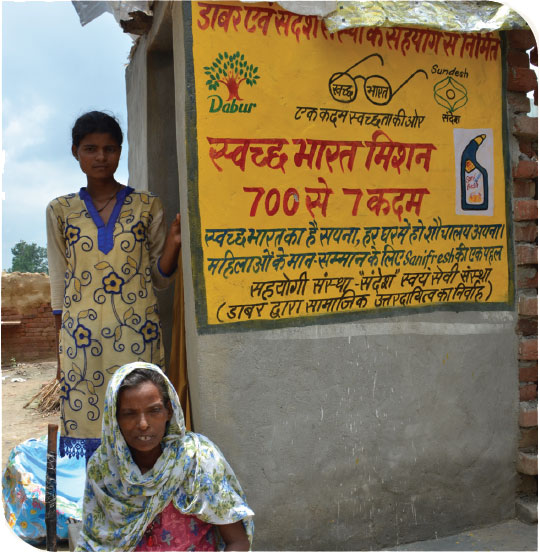
‘700 Se 7 Kadam’ Sanitation Drive
At Dabur, we believe that access to proper sanitation and hygiene is a fundamental human right. Yet, several people in rural India, particularly from the marginalised sections of the society, lack access to clean and safe sanitation facilities, leading to dire consequences for health, dignity, and overall well-being. We had joined the Government Swachh Bharat Mission in 2014 and helped make 59 villages Open Defecation Free by constructing nearly 4,000 household toilets.
Over the past year, we targeted newer villages near our operational areas to identify households that lack proper sanitation facilities and helped these families construct safe and clean toilets. In addition, we have helped the Madaari or street juggler community around Varanasi by providing the women in these community access to household toilets.
Access to clean sanitation facilities not only reduces the spread of water-borne diseases, but also upholds human dignity, especially of women and girls, enabling them to lead life with privacy and respect. We also run special awareness camps within these villages to improve hygiene practices that can go a long way towards contributing to overall economic development. Special toilet cleaning kits are also distributed among households. The year 2023-24 saw Dabur construct 42 household toilets in 3 villages.
We have also conducted a detailed review of the household toilets constructed in Uttarakhand, Uttar Pradesh and Himachal Pradesh. The review revealed that 98-99% of the household toilets constructed by Dabur are still in use with most of them being in good condition. The review also helped us identify some toilets that needed repairs. We have initiated the repair work, which includes repair/replacement of damaged toilet doors, fresh paint and plaster on toilet walls, and repair of toilet roofs in some cases.
Health Camps
Empowering marginalized communities through accessible healthcare services is a critical step in Dabur's journey on its mission of being Dedicated to the Health & Well-Being of every Household. We regularly organise general and specialised Ayurvedic health camps across the country to make quality health care accessible to vulnerable sections. Outreach camps are also conducted in the remotest villages regularly.
These camps seek to improve the health outcomes for marginalized communities and promote health equity through accessible healthcare services.
During the year, Dabur organised over 570 General Health Camps in addition to 947 Disease Specific Health Camps where Ayurvedic doctors offered free consultation to nearly 67,105 individuals. Lady doctors are also present at these camps to reach out to many women in the selected intervention areas.
Services offered include free health consultations, diabetes screening and free female consultation. Special disease specific heath camps we organised for Diabetes Screening, bone mineral density (BMD) Tests, etc.
A total of 831 Special Swarna Prashan Health Camps were organised across multiple cities on the auspicious Pushya Nakshatra every month, in which more than 15,000 children received Swarna Prashan. On Sharad Purnima, special health camps for skin and respiratory health were organised across the country. In this unique all-night health camps, which ran from 9 pm to 5 am, the medicines are kept exposed to moon rays all through the night and consumed in the early morning with Vedic chanting. More than 35,000 beneficiaries availed this service.
Dabur also runs a Wellness Centre in the walled city area of Delhi offering health check-ups and subsidised medicines to the public. The Ayurvedic practitioners at this centre also offered online consultations and teleconsultations to patients free of cost.
VridhCare
Ensuring a roof over their heads and providing critical care and support to elderly people who are destitute, sick or abandoned by their families is a critical need today. Understanding this need, Dabur India Limited has been supporting old age homes run by VridhCare Quality of Life Foundation in Delhi.
Together, we have been working towards the welfare of helpless and abandoned senior citizens. We support these centres with nutritious food for the elderly. Our employees also volunteer and participate in several wellness programs and events at old age homes to make them feel valued and loved.
These centres not only provide the primary need of shelter, food, clothing and care to the vulnerable aged group, but also provide them emotional support, counselling and physical care. These centres also create a positive environment through recreational activities like yoga, meditation, and support groups to relieve them of any feelings of isolation and depression. Regular health check-ups are also organised as we provide an opportunity for the elderly to continue to live their remaining lives independently and with dignity.
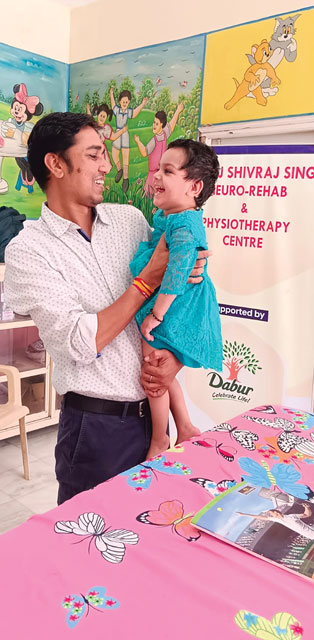
Saksham – Rehabilitation of Head Injury Patients
India today has the dubious distinction of being the ‘Head Injury Capital of the World’ with over 200,000 lives being lost due to head injuries every year. Equally alarming is the fact that 95% of trauma victims don’t receive optimal care in the ‘Golden Hour’, the first hour after an injury is sustained, and due to this more than half of these lives are lost.
In an effort to bridge this gap and ensure affordable treatment for comprehensive rehabilitation of head injury victims, Dabur joined hands with Indian Head Injury Foundation (IHIF) to implement 'Project Saksham'. Under the project, Dabur is supporting a charitable physiotherapy and neuro-rehabilitation centre in Jodhpur, Rajasthan, providing support to victims of traumatic brain and spine injuries. The rehabilitation centre focuses on two key areas of preventive care & curative medicine, and post-accident rehabilitation.
Curative programs include patient support groups, the hospital’s integrated rehabilitation approach, and a community health assistance program. The final aspects are long term rehabilitation and training of Home Care givers in Home Rehab. Rehab is also provided to children with autism and cerebral palsy.
Environmental degradation is today the single biggest threat to future generations. At Dabur, protecting the environment, taking actions to tackle climate change and ensuring environmental sustainability are key focus areas. Through our community-level development interventions, we have been working towards not just protecting the environment and conserving natural resources that are vital for ecological systems and human survival, but also helping enhance farmer livelihoods while providing rural communities with the knowledge and resources to build a more environmentally friendly and sustainable lifestyle.
Under our Environment Sustainability initiatives, we work to conserve the natural resources that are vital for ecological systems and human survival: water, air and soil. During the year, we rolled out community-led agriculture and water projects for local populations, provided solar-power solutions to communities, besides engaging them in environment-friendly bag production, tree-plantation, and plastic waste management.
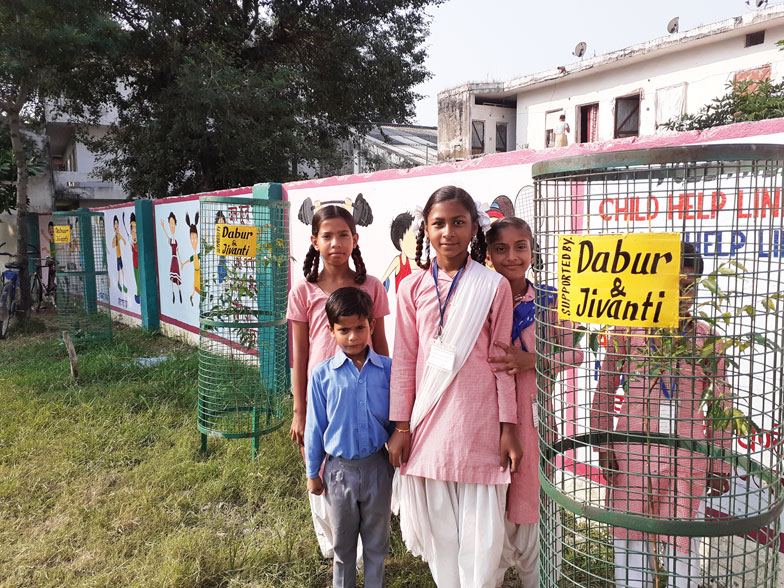
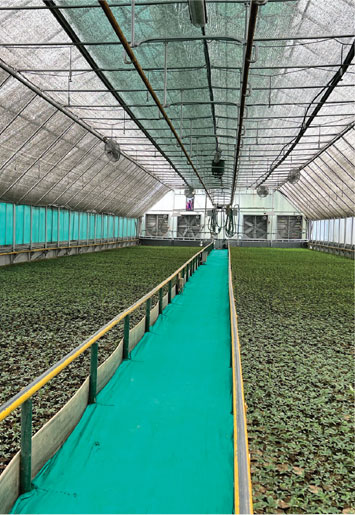
Herbal Kingdom
India is a treasure trove of medicinal plants, owing to its rich biodiversity. A bulk of these medicinal herbs come from wild sources. The unsustainable harvesting practices of medicinal plants from the wild leads to rapid degradation of the natural biodiversity. Understanding this threat, Dabur has come up with an all-encompassing solution by cultivating these medicinal and aromatic plants (MAPs) outside forest areas and on existing farmlands. This serves the dual purpose of putting a halt to accelerated loss of biodiversity while enabling farmers to enhance their income and livelihood through crop diversification with the inclusion of high-value medicinal plants among their crops.
A key part of our biodiversity protection and conservation initiatives is Project Herbal Kingdom, a community-level intervention that involves farmers, tribal and forest-based communities across India in conserving natural resources in wide-ranging ecosystems and promoting sustainable cultivation of rare medicinal herbs.
We engage small and marginal farmers across the country, supplying them quality plantation material (QPM) of medicinal plants and herbs grown at our state-of-the-art greenhouses, providing them training in sustainable cultivation and visible economic opportunities. This initiative has helped create an alternate source of income for the community and resulted in a 15%-50% increase in their income.
In 2023-24, we worked with 15 partner NGOs, engaging farmers, forest collectors and tribal communities in 34 districts across 12 states. A total of 10,877 farmers have been engaged in sustainable cultivation of herbs across the country and 10,145 acres of land has been brought under cultivation of medicinal and aromatic plants.
In addition, we have 2 fully automated greenhouses -- one each in Pantnagar (Uttarakhand) and Banepa (Nepal) -- where we grow these rare and endangered medicinal plant species. In FY 2023-24, we distributed 46,22,484 saplings free of cost to farmers across the length and breadth of the country.
The centre also offers scientific training to farmers in sustainable cultivation of medicinal herbs and plants. Farmers are also trained in best practices to conserve the natural ecosystem and increase their incomes through soil and water management, agroforestry, and crop diversification.
A detailed Impact Assessment of this initiative was conducted by a third-party agency in 2023-24, which can be accessed here.
Desert Bloom
Water brings life to Earth. The world, and each one of us, needs to stop taking water for granted as water availability, or the lack of it, affects every aspect of human life. Without its availability and sustainable management, the world would face severe challenges in meeting the food and water security of its future citizens.
Recognising the growing importance of community-level interventions for Water Conservation and Management, Dabur has implemented a series of initiatives under our Project Desert Bloom. Special interventions were rolled out in Uttar Pradesh, Himachal Pradesh, and Madhya Pradesh in 2023-24 with the aim of converting the target villages and making them Water Positive by augmenting water availability and increasing ground water levels.
The project has been developed with active community participation to facilitate sustainable livelihood of the poorest and excluded communities in the area by strengthening their access to water and technology as well as management capacities.
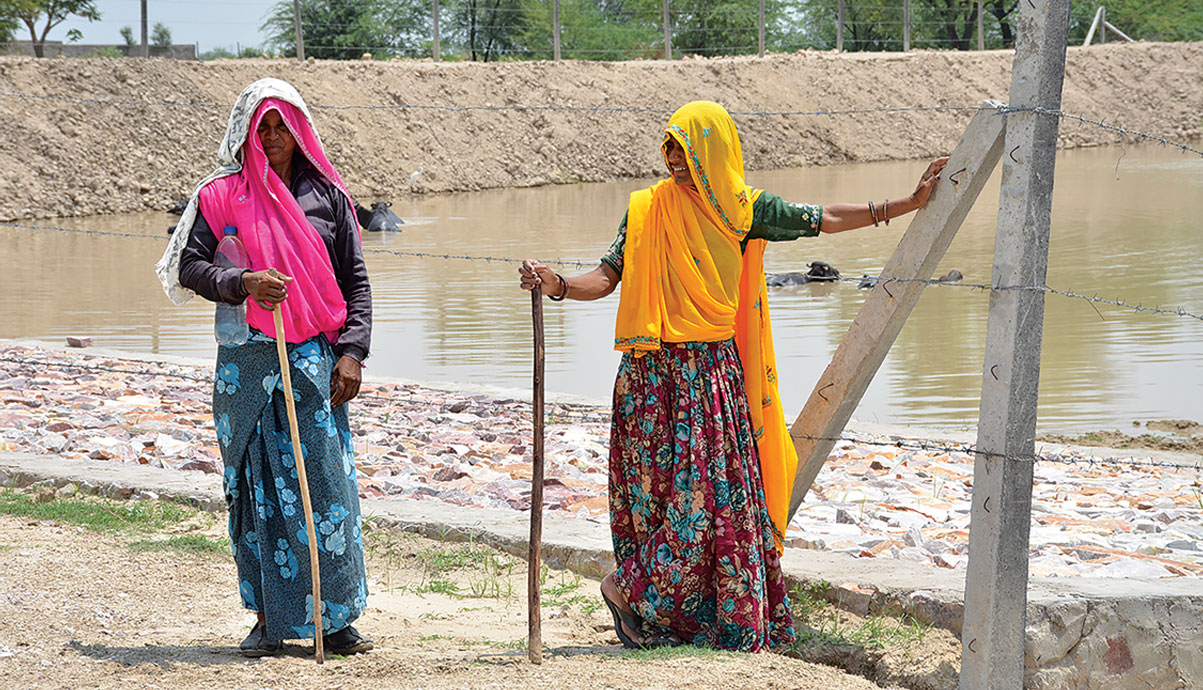
Focused interventions include water conservation and rainwater harvesting through check dams and roof-water harvesting, desilting & renovation of traditional and other water bodies & ponds, renovation and deepening of wells, recharging of tube-wells, watershed development and intensive afforestation. Our efforts have ensured that 11,686 residents of the surrounding villages have access to water all through the year for their personal consumption and irrigation needs.
A Village Development Committee (VDC) is also formed in all the villages before the construction activities start and the reconstructed water bodies are handed over to this committee for regular maintenance and management after the development work is completed. Sustainability of the program is ensured by close community participation in these projects, including through shramdaan or contribution through labour.
Our efforts have helped create 208,427 KL of Water Conservation capacity within the community, which marks a 355% jump over the previous year. We have also undertaken need Assessments in Katni & Pithampur (Madhya Pradesh) and Alwar (Rajasthan) for undertaking new water conservation projects in 2024-25.
Harnessing The Sun

As the world pivots towards sustainable energy solutions, community solar projects stand out as beacons of empowerment. Such interventions not only help expand access to energy services for households, schools, and communities in rural areas, but also go a long way in reducing crime rates and preventing animal-human conflicts.
At Dabur, we have been empowering communities in rural pockets of Uttar Pradesh, Uttarakhand, Madhya Pradesh, and Assam by harnessing sunlight to bring light in the lives of unserved and underserved populations living in these villages.
Under our 'Harnessing the Sun' project to promote the use of social energy, Dabur has installed Solar Street Lights and other solar-powered solutions across villages. We work with communities to erect Solar Street Lights in villages, with financial support from the communities and village panchayats.
During the year 2023-24, 82 Solar Street Lights/Equipment were set up in 6 villages and 3 schools, directly benefiting 2,563 individuals.
This project also helps spread awareness about solar technology, besides involving the next generation in taking decisive and concrete steps towards creating a greener future. This initiative has also helped reduce crime rates in these villages, besides curbing human-animal conflict in Sonitpur district of Assam.
Tree Warriors
The bond between humankind and nature has existed since the pre-modern era and is equally relevant today. At Dabur, we understand the importance of this bond. As part of our development agenda, we have rolled out several community tree planting initiatives across Uttar Pradesh, Uttarakhand, Madhya Pradesh, Jammu, Himachal Pradesh, and Rajasthan. These plantations are carried out both in shared spaces like schools, village parks, roadside, etc., and private homes to create a healthier, greener environment.
Under this program, a total of 6,198 saplings were planted, 455 tree guards erected across 20 villages and 11 schools in FY 2023-24. These healthy plants would provide the much-needed green cover in the villages and eventually act as an essential asset for enhancing groundwater levels and soil fertility in the region.
We also assist farmers in taking up plantation of poplar trees by providing financial support on a 50:50 basis. By fostering a sense of stewardship for the planted saplings, community members will also be able to reap the benefits.
The year also saw Dabur support government departments in Rajasthan and Madhya Pradesh in plantation activities.
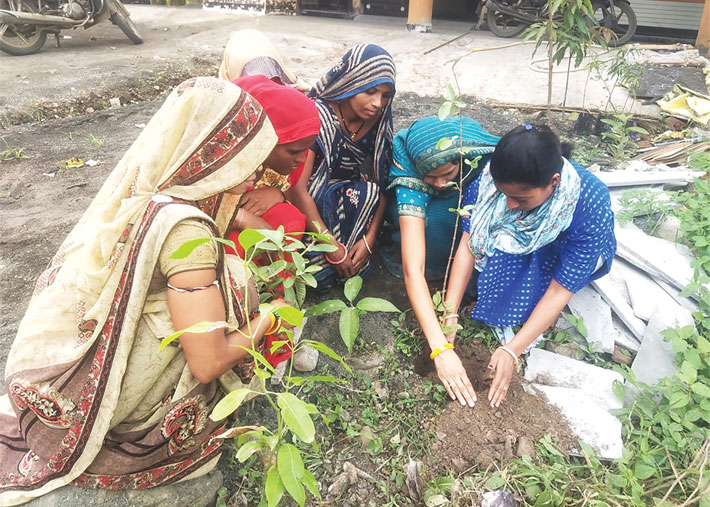
Supporting Plastic Waste Management
Urban India is witnessing environmental threats due to suboptimal level of waste management and increased plastic pollution. Improper handling and disposal of plastic waste leads to the accumulation of plastic waste in landfills and water bodies, causing severe damage to the ecosystem and posing health risks to humans and animals.
At Dabur, we have been actively working towards reducing plastic waste in our cities by bringing about behavioural changes while also encouraging women in our vocational training centers to produce sustainable cotton bags as an alternative to plastic bags.
Dabur today continues to be Plastic Waste Positive enterprise, having collected, processed/recycled 41,100 MT of post-consumer plastic waste from across the country. To support this plastic waste management initiative, we have been running a series of community-led interventions aimed at creating awareness about plastic waste management within the community and educational institutions.
Our ‘My 10 Kg Plastic’ in one such mega initiative, rolled out in association with Indian Pollution Control Association (IPCA), to spread awareness in the community about waste segregation at source. Today, we are collecting segregated plastic waste from more than 300 societies and educational institutions across Delhi-NCR and Jammu under this initiative and reaching out to more than 2 lakh beneficiaries. In all, 79,375 kg (~79 MT) of segregated plastic waste was collected and channelized for recycling during 2023-24 through the program. The year also saw us cross the milestone of collecting over 100,000 kg of plastic waste since the program's inception, with total collections at 168,453.3 Kg.
As part of our overall waste management program, we are also working towards offering Health Care support to the waste collector community. Through a dedicated Health Post established within their community in the outskirts of Delhi, we offer consultancy through an Ayurvedic and Allopathic practitioner besides medicines to meet their health care needs.
A series of awareness programs are also run for ragpickers to educate them about safe collection of consumer waste and improve their standard of living. We have provided safety gloves and face masks to the waste collectors to safeguard their health, besides addressing their nutrition concerns by providing them with a variety of nutritious food products.
We also support a non-formal education centre for the children of ragpickers in the area, offering them basic education and connecting them to mainstream schools.
A detailed Impact Assessment of this initiative was conducted by a third-party agency in 2023-24, which can be accessed here.
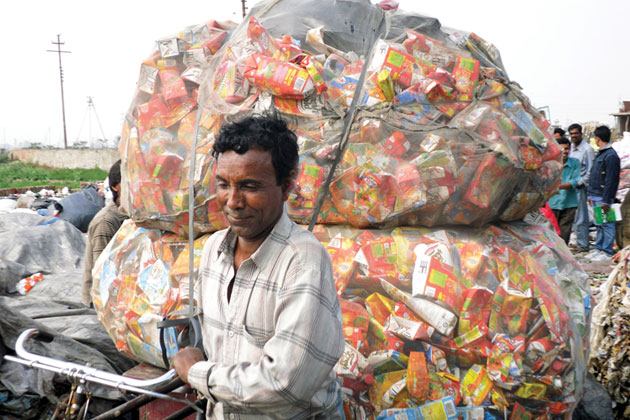
At Dabur, we believe that Education is both the means to a better life and a key to ensure overall development of the society. Our Education programs form a key pillar of our development agenda. On the one hand, we have been sensitising people living in urban and semi-urban slums on the need for education and encouraging them to enroll their children to formal schools. On the other hand, we work towards improving the infrastructure in schools to improve children's learning experiences. We also run Remedial Education Centres, Adult Literacy Centres, Community Library and Computer Literacy Centres in villages.
Adarsh Pathshala
With aging school facilities and overcrowded classrooms, kids in rural government schools have been facing learning challenges in their developmental stage. At Dabur, we believe that providing a healthy environment that benefits learning is vital to ensuring that kids learn, play and grow.
Under our School Support Program, christened ‘Adarsh Pathshala’, we are committed to improving the learning environment for kids in rural government schools by converting them into Model Schools, boasting the modern infrastructure and a comfortable environment that supports enhanced learning.
Renovating the learning environments in these schools is akin to investing in the overall wellness of our future generations, and it starts with providing improved learning spaces for today’s students. These renovations also go a long way in improving academic performance of students, reducing rate of distraction, greater information retention, and curbing school dropouts in rural India.
As part of this program, we renovate the entire premises, revamp classrooms, and create special play areas, beautify the walls and premises, construct separate toilets blocks for girls and boys, and provide drinking water and hand wash facilities, to to create safe and engaging school environment. We also provide sufficient equipment like computers and create science labs to support learning. We provide ergonomic desks and benches for students, besides providing almirahs and dustbins, and undertaking plantation activities to improve the green cover in the schools.
A safe and sound school infrastructure, we believe, is the first step to providing children with a brighter future. In FY 2023-24, 21 schools were redeveloped under the Adarsh Pathshala initiative, taking the total number of schools revamped till date to 202. These interventions provided an improved learning environment for 4,313 students.
Our efforts have resulted in curbing the dropout rates among girl students in several schools. Also, fresh enrolment rates in the schools revamped by Dabur have seen a 10-30% jump. With the transformation, the students are encouraged and enthused about attending schools regularly. Parents' attitudes towards Government Schools have also changed for the better following the revamp.
A detailed third-party Impact Assessment was conducted for this initiative in 2023-24, which revealed that access to desks & benches made the students more comfortable while attending classes and resulted in other hidden impacts like good handwriting, maintaining cleanliness, etc. Students also displayed increased concentration and focus on their studies following the intervention, indicating a positive impact on academic performance, learning outcomes. The program’s contribution to improved attendance, facilitated by separate toilet facilities for girls and boys, further enhances students’ educational engagement and overall academic wellness.
The detailed Impact Assessment report can be accessed here.
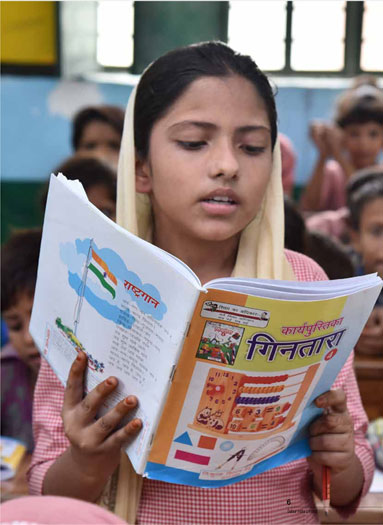
Computer Education
Basic knowledge of computer skills is increasingly important in today’s day and age. It not only drives social mobility, but also helps more people enter the job market and build a better future for themselves and their families.
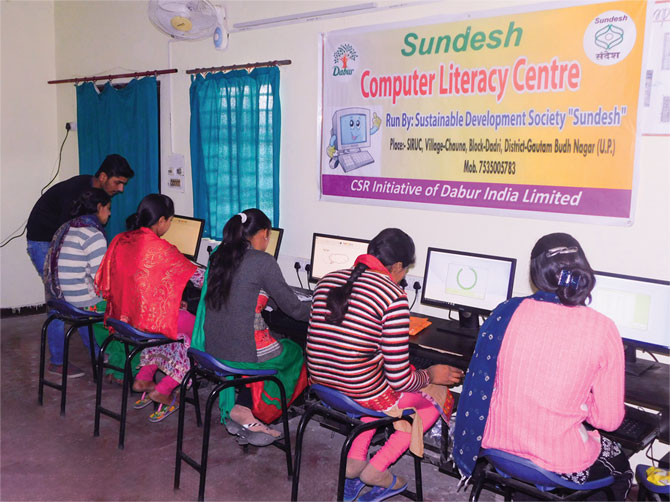
Dabur has joined hands with NIIT Foundation to set up Computer Literacy Centres in rural India, helping the youth build skills that foster employability and inclusive economic growth. Today, we have 8 Computer Literacy Centres operational in 5 states of Uttar Pradesh, Uttarakhand, Himachal Pradesh, Madhya Pradesh, and Assam, helping 355 local children and youth get basic computer education. We have further enhanced the curriculum with the inclusion of a course on Tally that improves the employability of local youth. It also opens the window to new career opportunities and increases their chances of gaining higher education. Besides, we are now crafting special courses to educate children and local villagers on matters related to cyber security.
Through a structured curriculum, we have been working towards improving digital proficiency, helping them understand the terminology associated with the technology, being able to load and use commercial software programs, and recognise various hardware components. The curriculum focuses on improving basic computer skills. These interactive courses and education programs have helped break the digital divide and move towards an inclusive and equitable digital India.
Success Story
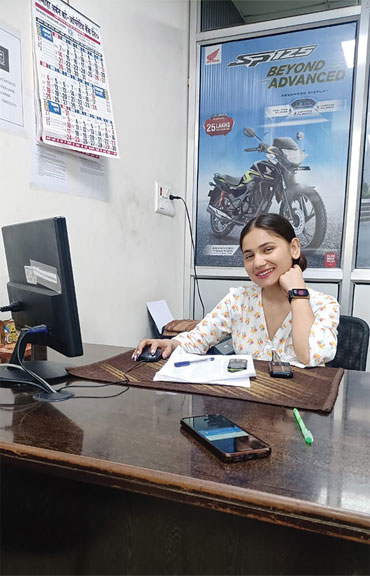
Savita Arya, Giving Wings to Dreams
Savita is a resident of Shastri Nagar in the bustling industrial city of Pantnagar. She hails from a humble family; her parents working tirelessly to make ends meet. Despite their hardships, they always encouraged Savita to pursue her dreams. With high hopes and a determined spirit, Savita ventured into the job market after completing her schooling. However, her limited knowledge of computers and technology became a big stumbling block, preventing her from realising her dreams.
One day, fate smiled upon her when she stumbled upon information about the Computer Literacy Centre being run by Dabur near her village. One visit to the centre and she realized that this could be her ticket to a better future. With unwavering determination, Savita enrolled in the course, eager to learn and grow. With the guidance of dedicated instructors and the support of her peers, she soon completed her course. The instructors also assisted her in finding a suitable job. Savita soon landed a job at a Honda two-wheeler showroom near her village. She embraced every challenge with enthusiasm, eager to prove herself in her newfound role.
Today, she earns a salary of `8,000 a month. With her steady income, she is able to provide her family with a better life, easing their burdens and fulfilling her promise to support them.
Gyan Arjan Kendra
(Remedial Education Centre)
Education, we believe, lies at the heart of building a healthy and self-reliant society. As part of our mission to promote education, particularly among the underprivileged sections of society, Dabur has established 16 Remedical Education Centres in five states -- Uttar Pradesh, Uttarakhand, Himachal Pradesh, Madhya Pradesh, and Assam. A total of 652 students are enrolled in our various centres.
Remedial education helps children, who are otherwise on the verge of dropping out due to bad grades, stay in school and blossom. These grades are not a result of incapability, but of inadequate support from parents and, at times, from schools. Our centres support these struggling learners and weak students, helping them improve their learning and grades. Through our educators, we deliver high-impact learning and performance support in a nurturing environment.
This initiative has helped us improve literacy levels among children in these communities.
Bhawna Sammal, A Journey of Excellence
Our Remedial Education Centre in Bindukhatta, Nainital, is a place where dreams are nurtured. In this bustling classroom sits Bhawna Sammal, a tiny tot who braved all odds to embark on a journey of academic excellence that ultimately led her to soar beyond expectations.
Born in a humble family, Bhawna faced numerous learning challenges as her family was not able to guide and assist her in her studies. To support her, Bhawna's parents got her enrolled at the Jivanti Gyan Arjan Kendra, the remedial education centre in their village. At the Jivanti REC centre, Bhawna found a nurturing environment that encouraged her to dream big and work hard to achieve her goals. She was greeted by dedicated educators who saw beyond her struggles and believed in her ability to excel. With patience and understanding, they assessed her strengths and weaknesses, tailoring a personalised learning plan to suit Bhawna's needs. With access to quality education, dedicated teachers, and a supportive community, Bhawna thrived academically and personally.
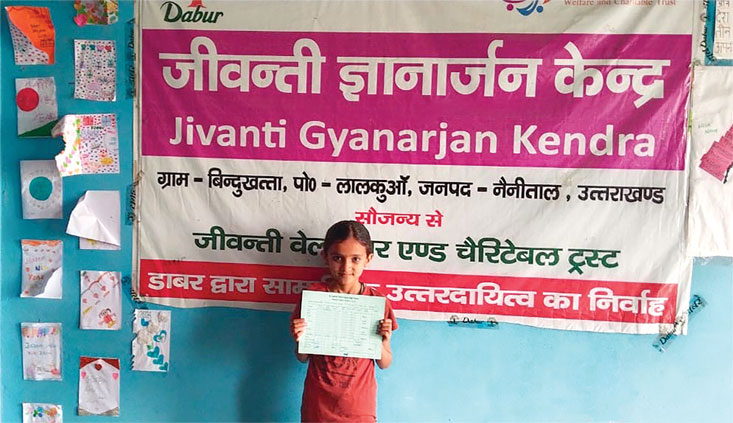
All the hard work finally bore fruit as Bhawna scored a remarkable 91% in her 5th-grade exams. More than just academic success, the centre has given Bhawna a sense of purpose and pride in her achievements, knowing that she had overcome all odds through sheer grit and perseverance.
Skill Development and Vocational Training are powerful agents of social transformation as they open doors to a diverse range of career opportunities, particularly for the rural youth and disadvantaged sections of society. Not only do they provide learners with enhanced employment opportunities, but these skills also generate self-employment opportunities and help communities become more resilient.
Nari Shakti Kendra
Dabur has been working towards empowering young women and men in rural areas with relevant skills and support to enhance their employability and productive engagement in economic activities. We operate 24 Skill Development Centres in 5 states of Uttar Pradesh, Uttarakhand, Himachal Pradesh, Madhya Pradesh, and Assam, offering vocational skills training to local women & girls in Stitching-Tailoring and Beauty Care. This year, 1,091 girls and women from 33 villages have undergone training at these centres.
The year 2023-24 saw Dabur join hands with Usha Silai School to provide our Stitching-Tailoring students advanced training in tailoring and machine repair/maintenance.
These skills help them find employment in the fast-emerging services sectors or even emerge as social entrepreneurs in their respective villages. The project targets women and youth with a particular focus on school dropouts and housewives from financially challenged communities. Our mission is to unlock economic self-reliance and promote entrepreneurial creativity among these youth and young adults, helping them craft a sustainable future for themselves. Our students are today earning between 10,000-50,000 every month from these skills.

Success Story
Kavita, The Beautician Didi
Kavita got married at an early age. Their entire household was dependent on her husband's monthly income of `12,000, which was never enough to lead a comfortable life.
She wanted to support her husband and supplement their household income, but did not have access to any such avenues. That's when she heard about Dabur's Vocational Skill Training Centre from her friend. She visited the beautician training center in Rudrapur and enquired about the course.
After successfully completed her 6-month course, she took up a job at Ark Studio Parlour in her village. Today, she is earning a monthly salary of `7,000 and is ably supporting her family. "I am today more confident about not just my future but about the future of my daughter. Now I can provide her a comfortable life, thanks to the support from Dabur," beams Kavita.
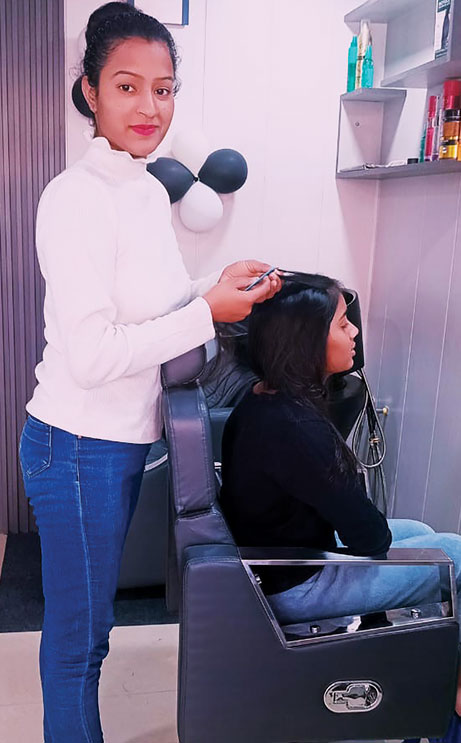
Karuna, the Tech-Savvy Tailor
Karuna belongs to a poor peasant family with low household income. Despite being a studious kid, she was forced to drop out of college due to the family's financial condition.
Tailoring was her other interest, but she could not pursue it too due to financial stress. When Dabur opened its Vocational Training Centre in Gurumajra, she joined this centre as the fee was nominal and well within her budget. After completing her 6-month training program in stitching & tailoring, she started taking up stitching jobs from her home.
Today, she earns around `2,000-3,000 every month and more during the wedding season. Having saved some money from the stitching job, she is now pursuing a Computer Education course from Nalagarh and paying the `1,000 fees from her savings.
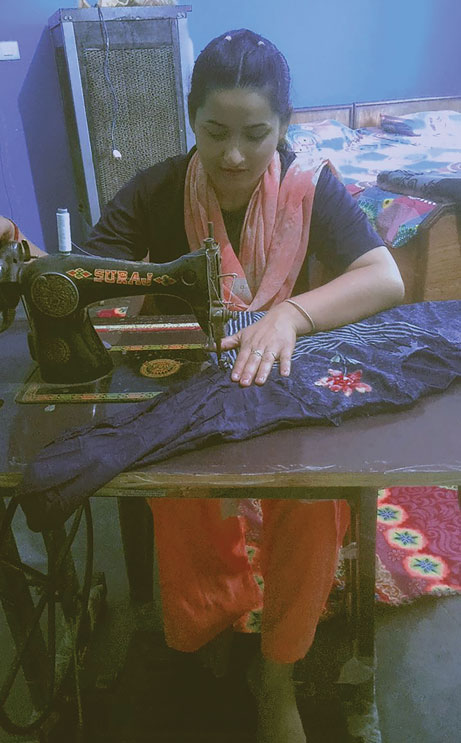
Livelihood Support
Livelihood Support programs weave resilience and empowerment into the fabric of our community by promoting economic stability and self-sufficiency. We believe that sustainable livelihood-centred interventions, that are designed around local or regional needs, help build resilience and create long-lasting positive impact, particularly among the weaker sections of society.
At Dabur, we have rolled out a special initiative in Assam to build the capacity of small and landless individual members of women SHGs by undertaking duckery production, pig and goat rearing as profitable businesses. For this project, we engage Self-Help Group (SHG) members and provide them scientific training in undertaking these activities.
A total of 31 women from 2 villages in Sonitpur district of Assam have been supported to undertake these income generating activities. We also link them with various government schemes and provide entrepreneurship development and financial education to these disadvantaged rural women, helping them develop the skills they need to build a business and manage money.
This initiative has gone a long way in raising the self-esteem of women by building and fostering an entrepreneurial mindset amongst the rural folks.
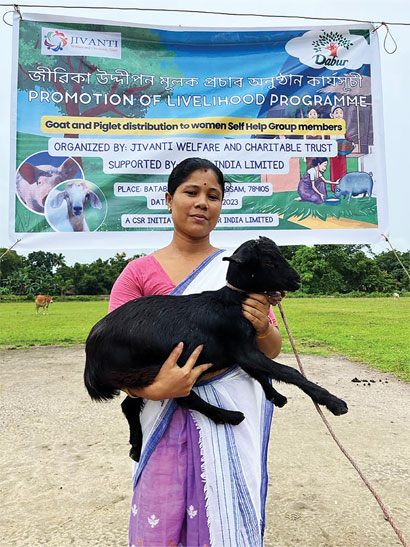
Beekeeping Training
Beekeeping is an essential practice that not only contributes to the preservation of our environment, pollination of crops, ensuring food security and biodiversity but also offers tremendous potential for income generation and sustainable livelihoods in communities. However, for many young people, especially those in underserved regions, access to the necessary training and resources is limited.
Understanding this need gap, Dabur has been running development projects across four states -- Uttar Pradesh, Uttarakhand, Bihar, and Jammu & Kashmir -- to train local youth, particularly women, and promote ethical and sustainable beekeeping practices.
Our comprehensive training program on beekeeping focuses on best practices in beekeeping, hive management, and honey production, all while emphasising the importance of bee health and ethical treatment. A specialised beekeeper training module has been designed to equip both novice and experienced beekeepers with the knowledge and skills required for successful, ethical, and sustainable beekeeping. The program covers topics such as hive maintenance, disease management, pollination services, and honey extraction techniques.
The year 2023-24 saw Dabur join hands with Sher-e-Kashmir University of Agricultural Science and Technology, Kashmir to support and train beekeepers from Kashmir on best practices in beekeeping, and also empower the local youth by engaging them in beekeeping. Under this joint initiative, a seven-day training program was organised in the university to impart technical knowledge required for efficient management of bee colonies and impart best beekeeping practices. The training helped provide income-generating opportunities to the local youth while bridging the skill deficits at the ground level.
During the year, we have supported and trained 15,374 beekeepers from across these four states. We also distributed 51,450 bee-boxes to these farmers to provide them with the initial support for setting up a beekeeping business.
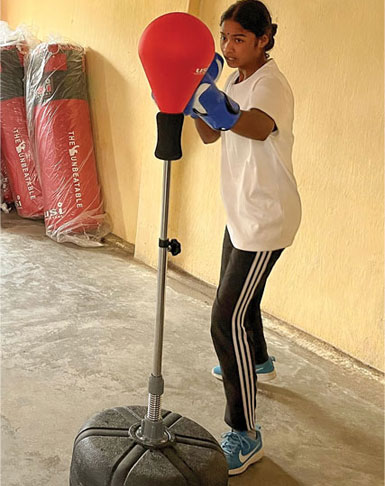
Sport is a vital component for the overall development of an individual and the nation. While the recent years have seen the Government of India provide world-class training and infrastructure facilities to talented sportspersons under the Khelo India Program, large portions of rural India still do not have access to facilities and the sporting talent in these regions go unnoticed. This initiative seeks to bring together young talent and professional experts on a single platform to not only nurture local talent but also bring about social change through individual development.

Football & Boxing Training Centres
Under this special initiative rolled out for the youth (both boys and girls) in Assam, we have been working towardsidentifying and promoting grassroots football and boxing talent. Our Football Training Camp in Tezpur offers boys and girls training in football, a sport of choice in the region. A national level trainer has been hired to conduct the program. Several trainees from the Jivanti Football Coaching Centre have represented the Sonitpur District Football Team at the Inter District Football Championship, besides being selected to represent private football clubs.
Trainees from Jivanti Boxing Training Centre have also been selected to represent Sonitpur district and Assam state at various National Boxing Championships.
Success Stories
Chitra Raj Limbu, the star boxer
Chitra Raj Limbu is today one of Assam's most promising young boxers. Hailing from Belsiri in Sonitpur district of Assam, Chitra is the youngest of six siblings. He shares a close bond with his father, who has supported him throughout his journey. As his father aged, Chitra took it upon himself to support both his education and his boxing career, showcasing his resilience and determination.
Chitra's commitment to the sport led him to join the Jivanti Sports Coaching Centre for Boxing in Rangapara. His dedication and hard work quickly propelled him into the spotlight as one of Assam's rising boxing stars. His achievements include winning a Gold Medal and being named the Best Boxer in the elite section at the All-Assam Inter-District Junior and Elite Boxing Championship in Guwahati in 2023.
His success continued as he bagged a Gold Medal at the BFI East Zone Elite Men's Boxing Championship in Meghalaya, and a Silver in the 48 kg weight category at the 3rd Northeast Olympic Games in Sovima, Dimapur, Nagaland. These accolades established him as a force to reckon with in the world of boxing.
Chitra's journey has now come full circle, as he was recently selected as a coach under Khelo India and is currently serving as a boxing coach in the Udalguri district of Assam. His story is one of perseverance, talent, and the desire to give back to the sport and community that has shaped him. Chitra Raj Limbu's future in boxing looks bright, and his impact on the next generation of athletes in Assam is already being felt.
Neha Powdel
Neha Powdel is the epitome of sheer determination and resilience. Living in Orang, a village in Udalguri district of Assam, with her family of modest means, Neha's journey to success is nothing short of inspiring. Her father, who runs a small tea shop at Orang center to support his family, has been a source of strength and motivation for Neha. Despite her young age, she has managed to excel not only in her studies as a 7th-grade student but also in pursuing her passion for boxing.
Neha's journey to becoming a promising boxer began at the Jivanti Sports Coaching Centre for Boxing in Rangapara. Her hard work and natural talent quickly set her apart from the rest, earning her a place at the prestigious SAI Centre Kokrajhar in Assam. Neha's rise to prominence continued when she bagged the Silver medal at the REC Eastern Open Talent Hunt Boxing Program held in Guwahati in March 2024. This achievement showcased her skills and highlighted her as a boxer to watch out for.
With her remarkable achievements at such a young age, Neha is undoubtedly on the path to becoming one of the best boxers of her generation.
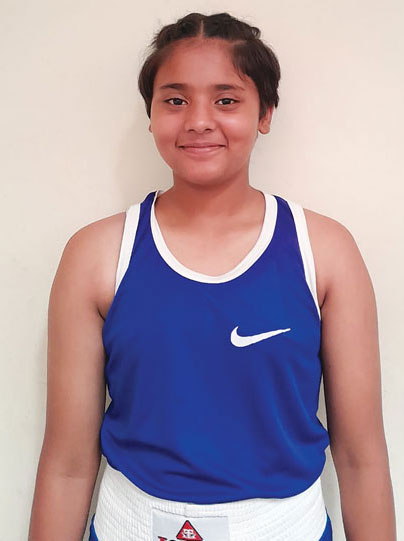
Premika Basumatary
Premika's journey is a remarkable tale of perseverance and strength against all odds. She grew up in Belsiri, a village in the Sonitpur district of Assam, where she lives with her mother and younger sister while her father works as a migrant laborer in another state to support the family. Despite these challenges, Premika's determination and drive helped her excel both in academics and in athletics.
While attending her 9th grade, Premika's passion for boxing led her to join the Jivanti Sports Coaching Centre for Boxing in Rangapara. Her dedication quickly paid off, as her talent was recognised by coaches and peers alike. With her family's unwavering support and her own relentless pursuit of excellence, Premika's journey took a significant leap forward when she was selected to train at the SAI Centre in Shillong, Meghalaya.
Her hard work culminated in a notable achievement in March 2024 when she won the Bronze medal at the REC Eastern Open Talent Hunt Boxing Program (Elite, Youth, Junior & Sub Junior) held in Guwahati.
Premika's story serves as a source of inspiration for many young athletes who face similar struggles. As she continues to train and improve, there is no doubt that Premika's future in the sport is bright, and she will make an even greater impact in the world of boxing.
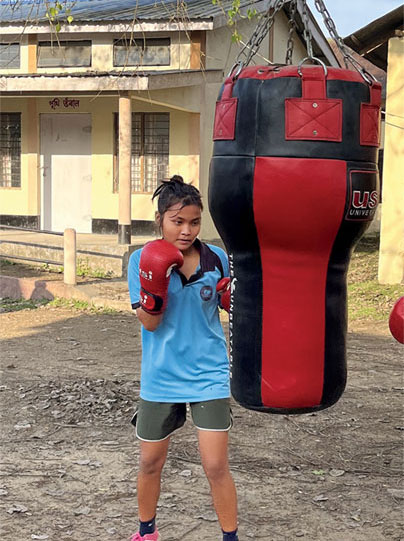
We also monitor the outcomes and milestones of our projects and carry out independent Impact Assessments, both through a third-party and internally, at regular intervals. In 2023-24, we conducted the Social Impact Assessment for 5 CSR projects.
Programs to meet nutrition needs of poor and needy
Dabur India Limited, in collaboration with multiple NGOs as implementing partners across India, executed an intervention aimed at organising awareness sessions and distributing food items to disadvantaged populations within communities. The primary objective of the intervention was to offer nutritional and healthcare support to needy communities. The project activities included provision of food products and nutritional supplements to rural, disadvantaged communities; and conducting awareness sessions within the community on health, hygiene, and nutrition issues, along with organising health camps.
The project sought to raise awareness and address the nutritional requirements of the population, particularly marginalised communities. The Impact Assessment was conducted by SoulAce, a third-party NGO, in 6 districts across 2 states of North India. It covered 400 participants across these locations, which included beneficiaries, including children, and project coordinators in Partner NGOs, children, and project coordinators in Partner NGOs.
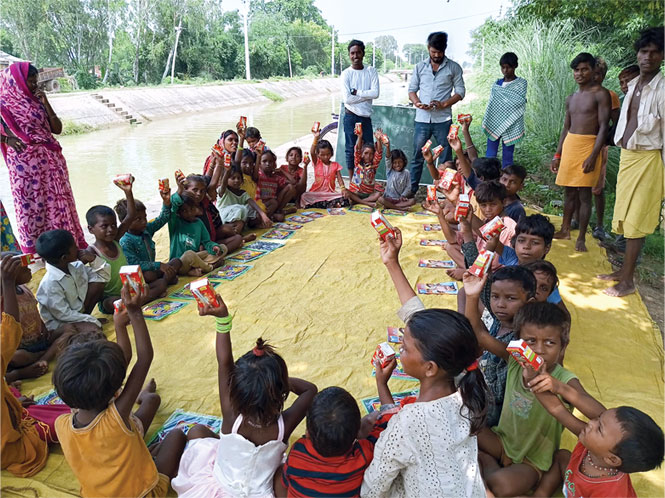
Key Impacts of the program:
- Enhanced Understanding & Awareness: Increased knowledge regarding hygiene habits and nutrition among community empowered stakeholders, including students and wage earners in the community, enabling them to contribute to creating a more conducive environment for the overall well-being of the community.
- Enhanced Individual Well-Being: The community experienced improved overall well-being due to the relief items provided to them. This suggests that the program contributed to the community's development, leading to relief and a healthier lifestyle. The program also provided relief from stress by arranging food and saving from starvation.
- Nutritional Education & Empowerment: In addition to food item distribution, the program includes educational components focused on nutrition and healthy habits. By empowering the community with knowledge about food items and nutrition, the program promotes long-term health and self-sufficiency.
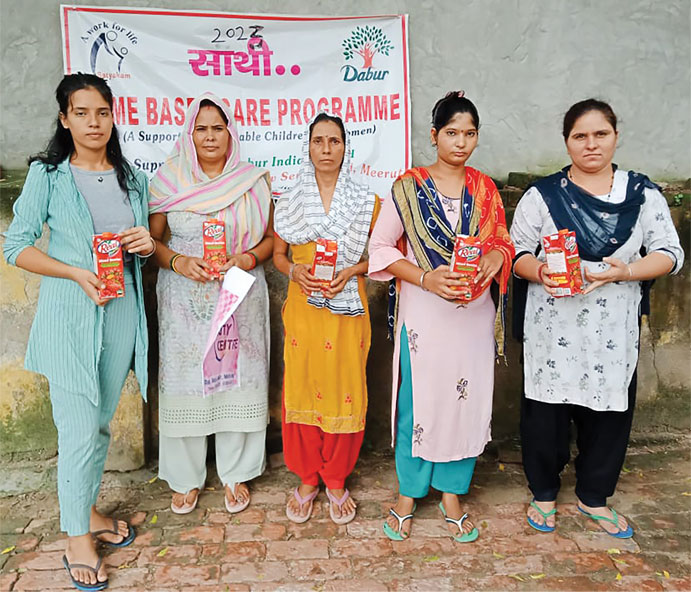
Programs to provide healthcare support to underprivileged sections of society
As part of its CSR intervention through multiple 3rd party NGOs, Dabur has undertaken programs on providing healthcare support to underprivileged sections of society. Several initiatives with respect to health care, health awareness, health camp and supplementation of health goods were rolled out with the support of various State governments and NGO partners to protect the health of the underserved members of the community.
The project was executed with the objective of building awareness on multiple health issues; supporting NGOs and Government departments in organizing camps and awareness programs; and ensuring socio-economic welfare of the marginalised sections of society.
The Impact Assessment was conducted by SCORElive Impact Crew, a third-party NGO, in 4 states of North India. It covered 400 participants across these locations.
Key Impacts of the program:
- Health & Hygiene improvement: The most visible impact of the program is awareness towards health & hygiene and sense of responsibility within NGOs who work tirelessly to support various types of beneficiaries.
- Improved Awareness: Across various beneficiaries, there is good awareness about healthy food and the importance of hygiene practices.
- Improved Immunity: School children, especially in government schools, understood the importance of the health and the implications of poor health.
- Support to Cancer Patients: Cancer patients get access to hygienic goods so that they can maintain bodily cleanliness.
Herbal Kingdom: Programs to protect endangered species of herbs & plants, enhancing farmer livelihood
Dabur has worked with 12 implementing partners pan-India to protect endangered species of herbs and medicinal plants through the ‘Herbal Kingdom’ intervention. The intervention helps establish nurseries for the cultivation of saplings of endangered/important medicinal and aromatic plants (MAPs) and distributing the herb quality planting materials (QPM)/saplings and seedlings to farmers for subsequent cultivation.
The project was rolled out with the broad objectives of conserving and restoring forest ecosystem; enhancing income of farmers and associates, capacity building and awareness generation; and on-site preservation of germplasm of critical species of herbs for future large-scale multiplication.
The Impact Assessment was conducted by GIVE Grants, a third-party NGO, in Uttarakhand and Odisha, covering 204 participants.
Key Impacts of the program:
- Increase in income: 87.5% of farmers confirmed an increase in income due to this intervention. The project has the potential to increase farmers’ income by 15%-50%
- Improved Quality of Life: The spike in the income has resulted in an improvement of quality of life with 58.9% having upgraded their housing, in most cases from a kutcha house to a pucca house. 73.2% have gained/created assets. Families of 87.5% of farmers are now investing in their children’s education, including girls.
- Market Linkage: While 26.8% of the farmers sell their products only to Dabur, 42.9% have access to local vendors and 12.5% sell it directly in the open market. NGOs support marketing for 17.9% of farmers.
- Conservation of wild varieties of medicinal plants
- Increase in cultivated land
- Reduction in use of chemical fertilizers
Programs to support Plastic Waste Management
Through Jivanti Welfare & Charitable Trust, Dabur has rolled out interventions to support plastic waste management by creating awareness among ragpickers about safe waste handling practices and effective plastic waste segregation methods. In addition, the intervention also looks at a bottom-up approach by involving multiple stakeholders at household and community levels such as women, housing society members, school students and teachers to ensure a sustainable solution in Solid Waste Management.
The Impact Assessment was conducted by GIVE Grants, a third-party NGO, in 3 states, and covered 232 participants.
Key Impacts of the program:
- 49% of the waste workers across the sample location of Ahmedabad and Delhi NCR rated the program 5 (Excellent) when it comes to ease of understanding of the training content.
- 100% of the respondents from waste worker category rated the program as excellent.
- The household and community members have rated the program 5 (Excellent) with respect to the relevance of waste management content at the community level and ease of adopting waste management practices.
- 85% of SHG women consider the training session on cotton bag-making Highly Effective.
- 84% of the respondents from households rated the program 5 (Excellent).
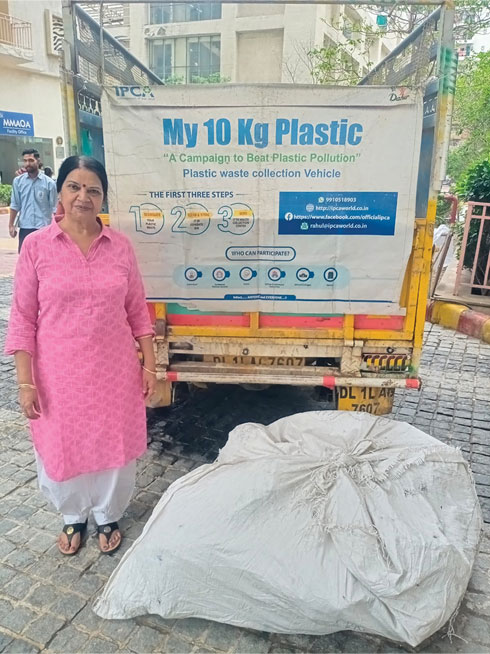
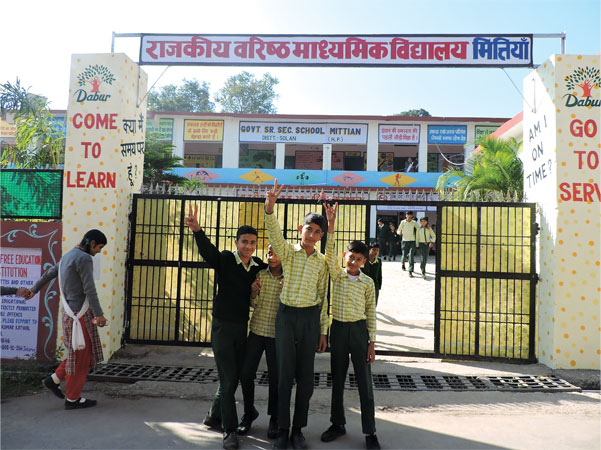
Adarsh Pathshala: School Support Program
Dabur has rolled out initiatives towards enhancing infrastructure in government schools, with a particular emphasis on sanitation, cleanliness, the visual appeal of schools, and fulfilling basic classroom requirements like desks and benches to create a conducive learning environment for the students in these schools. This program was executed across seven states in India. The main goal of the intervention was to enhance the school environment by renovating school infrastructure.
The Impact Assessment for this project was conducted by SoulAce, a third-party NGO, in 3 states of Uttarakhand, Himachal Pradesh and Assam. It covered 188 participants across the 3 locations, which included students, teachers, parents, and members of School Management Committee.
Key Impacts of the program:
- Improved comfort and focus during class: 93.6% of students expressed feeling comfortable sitting for longer period of time with new desks and benches. This also enabled them to improve their handwriting.
- Improved Educational Engagement: Students displayed increased concentration and focus on their studies following the intervention, indicating a positive impact on academic performance, and learning outcomes.
- Improved Health of Students: The intervention resulted in significant improvements in student health and hygiene practices, particularly in handwashing, facilitated by the provision of separate toilet blocks for girls and boys in schools, along with wash basins.
- Enhanced Individual Well-Being: Hygienic toilet facilities and improved cleanliness have enhanced students' dignity, provided privacy, and contributed to increased retention and attendance, ultimately reducing dropout rates.
- Improved learning environment at school: Implementation of BaLA painting, along with the construction and renovation of school infrastructure, has contributed to a more conducive learning environment.
Employee Volunteering is a powerful tool for creating meaningful engagement with the community and positively contribute to society and the environment. At Dabur, we encourage our employees to actively participate in community development projects. We have put in place an employee volunteering program called 'A Step Together' to encourage members of the Dabur family to partner in our CSR interventions and contribute towards improving the quality of life of people from underserved sections of the society.
A CSR Activity calendar is finalised and is shared with the employees across offices and units. The employees can pick from our list of interventions and participate in making a meaningful contribution to society. Such programs not only have a positive impact on society but also boost employee morale and engagement.
In the last one year, our employees have contributed in some extremely impactful ways to address community needs across locations. Dabur employees have participated in beach clean-up drives in Mumbai, undertaken nutrition awareness sessions for the community in Tezpur, been part of plantation drives across locations, taught children about recognising Good Touch and Bad Touch, besides spending time and engaging with the elderly in old age homes supported by Dabur.
Further, employees are also kept aware of the company's development interventions through the corporate website, intranet, and social media. Such activities also have a positive impact by increasing job satisfaction and productivity.
Way Forward
Dabur is committed to its motto of being 'Dedicated to the Health & Well-Being of every Household'. While our nature-based products help bring this vision to life for our billions of consumers across the globe, our CSR interventions are an extension of this pledge as they help us work towards enhancing the lives of local communities and providing opportunities for them to become self-reliant and improve their quality of life.
We remain committed to creating products and solutions that meet the ever-changing needs and aspirations of our consumers. As the custodian of Ayurveda, Dabur has been marrying the traditional knowledge of Ayurveda with cutting-edge Science to create a range of efficacious products for all generations. As we go about developing these products, we have also been relentlessly working towards preserving and protecting our valuable natural resources by managing them intelligently and sustainably.
As the country's oldest and largest Ayurveda and Natural Healthcare company, our strength lies in reaching out to local communities across our areas of operation and creating unique sustainable programs to address the specific challenges faced by the local communities. At Dabur, we firmly believe that our success is intertwined with the well-being of the communities we serve. Together with our implementation partners, we aim to make a difference in people's lives through impactful initiatives that have a lasting effect.
Our community development interventions straddle areas like Nutrition, Health, Sanitation, Education, Environment Sustainability and Women's Empowerment. We are working towards enhancing farmer income by engaging them in the cultivation of medicinal herbs. We have set ourselves the target of sustainably cultivating medicinal and aromatic plants on 15,000 acres of land by 2030, which will mark a 200% increase over 2020. We have also targeted to enhance the livelihood of more than 13,500 farmers' families by 2030, a 100% increase over 2020. We have ended the fiscal by engaging 10,877 farmers in this livelihood enhancement initiative.
We had started the year 2023-24 with the target of responsibly caring for and transforming the lives of 3 Million people during the year. By the end of the fiscal, we exceeded this target by bringing about a positive change in the lives of 3.05 million individuals, including people living in the aspirational districts of the country.
We are now devising interventions to surpass our next milestone of touching 4 million lives in 2024-25 as we progress towards sustainably and positively impacting the lives of 5 Million beneficiaries through our range of development activities by 2030.
